

6th Grade Essay Topics – Best 100 Essay Ideas for Sixth Graders
6th grade essay topics don’t have to be boring and uninspiring. With the right essay topics, sixth graders can express themselves in depth and descriptively. This article aims to highlight 100 amazing essay topics for 6th graders that’ll enhance their writing skills and improve their mental performance. These essay topics all meet the Common Core Standards.
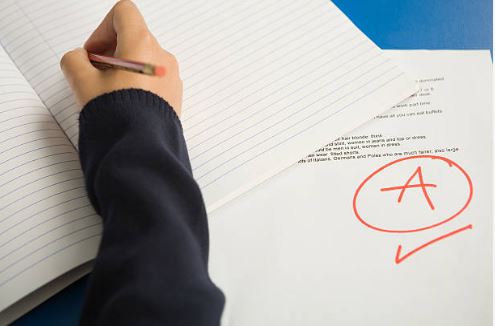
Since the 6th grade is the bridge to middle school, teachers will ensure students are prepared for middle school. The emphasis will be laid on the quality of writing and frequent writing assignments and tasks. The key to boosting the writing creativity of 6th graders is allowing them to research essay topics in advance. This will enable you to be more prepared and organised. To find the perfect 6th-grade essay topics, you have to allow your students to sift through the list of essay topics and select the one they feel interested in.
Narrative Essay Topic for 6th Grade
Whether you want your students to recount an event that happened shortly or an adventure that need them to fuel their imaginative spirit, narrative essays tell a story. The narrative essay is structured with a plot, which organizes it into beginning, middle and end.
Here are some narrative essay topic for 6th graders:
- Think about the best day of your life. What made it so great?
- Who is the oldest person you know?
- Describe a friend situation that changed over only one day.
- Write about how it feels when you’re alone.
- Describe your favourite vacation.
- Has a book, movie, or album ever changed your life?
- Think about your future self. Write about a day in your life, one year from today.
- Tell a family story from your perspective.
- Describe a memory you have of extreme weather.
- Think about a time you had to work hard to learn something.
- Your first day of school.
- Your most exciting day of school
- A field trip that your class took.
- Your favourite summer vacation.
- A trip that included something unexpected or surprising.
- A time that you experienced something spooky.
- A time that you experienced something truly frightening.
- A time that you learned something new that changed you in some way.
- The moment when you met someone who changed your life.
- The day that you got your first pet.
- A move from one place to another.
- Something funny that happened to you.
- Something funny that happened to one of your family members or friends.
- Something embarrassing that happened to you.
- Your favourite birthday party.
- A birthday that was disappointing.
- A big storm (rain, snow or even a tornado!).
- A time that the power went out.
- A summer day when the temperature got much higher than expected.
- A time when you went to an amusement park
- A time when you got lost somewhere.
- A memorable experience with a favourite family member
- A sad experience with someone about whom you care
- Your most exciting moment playing sports
- Your most exciting moment is performing in a play, singing, playing music, or dancing.
- An experience that left you feeling frustrated.
- An experience that was hard but ended up being worth it.
- A time that you experienced rejection.
- A weird encounter with a stranger
- A random act of kindness.
- A time that you took a stand for someone or for an issue that you care about.
- A moment when you thought you might get hurt but didn’t.
- Breaking a bone (or otherwise suffering an injury).
- Your first time away from home for the night (or longer).
- A time when you experienced a historic event.
- Where were you when a major event happened? (Note: You don’t need to have been at the site of the event; this prompt is about where you were when you found out about the event and how you reacted.)
- A time when you rebelled against your parents or teacher.
- A dangerous experience.
- A misunderstanding between yourself and someone else.
- A difficult decision that you had to make.
- The end of a friendship or relationship.
- The beginning of a friendship or relationship.
- A time when you judged someone first and then realized that you were wrong about the person.
- A time when someone judged you first and then realized that he or she was wrong about you.
- A moment when you felt that you were starting to grow up.
- A time when you saw one or both of your parents in a different light.
- A time when you looked up to your older sibling
- A time when your younger sibling looked up to you
- A time when you were grateful to be an only child.
- An experience that you think has only ever happened to you!
Expository essay topic for the 6th Grade
Expository essays are informative. They are fantastic tools you can use to teach your 6th graders about the method of exploring and researching. You’d want to build their writing skills. So here are some Expository essay topic for the 6th graders:
- Write an extended definition essay on one of your vocabulary words.
- Pretend a friend hasn’t seen your favorite TV show. And what is it about?
- Compare and contrast two of your friends.
- Describe your school year so far. And what have been the most important events?
- Choose a problem at your school. And what’s the best solution?
- What was the cause of a recent argument you had? And what was the effect?
- Compare and contrast two of your favorite sports or activities.
- Discuss a conflict in a movie you like. And how was it resolved?
- Write a definition essay about the concept of empathy.
- Explain how to send a friendly text message.
- Teach a reader how to play your favorite board or card game.
- Write about the steps needed to tie a shoe.
- Create a user manual for something you use a lot (e.g., hair straightener or cell phone).
- Describe how you get home after school.
- Tell a younger reader how to do homework without wasting time.
- How do you get to the library from your classroom?
- How do you choose what to watch on a streaming service?
- Explain how to pass a difficult level in a video game.
- Write about the steps you follow to listen to your favourite music.
Argumentative essay topic for the 6th Grade
Read: How to Write a Unique Scholarship Application
The argumentative essay is about debating. It is formal writing that aims to persuade readers to the writer’s line of thought or point of view. It is one way of spurring curiosity in your 6th grader, allowing them to passionately research and boost their writing skills.
Here are some argumentative essay topics for the 6th grade:
- Would you rather get or give a gift?
- If you were anybody when you grow up, who’d you be?
- What is the most selfless thing that you have ever done?
- Do you believe that there are things that only men or only women can perform? Why or why not?
- Do you think that astrological horoscopes are true?
- What are some of the problems faced by immigrants to a new country? How did this experience make you feel?
- What was the funniest moment you’ve ever experienced? Why?
- How do you talk to somebody who has political or spiritual beliefs which are different than your own?
- What is the longest time that you have ever kept a secret? What was the key?
- Write about an experience where you thought you knew something for certain, but were later turned out to be wrong.
- Name and explain somebody that has been a inspiration to your life.
- In 20 years, where do you think you’ll be? What will you do?
- How do you start a conversation with somebody that you do not know?
- What is your deepest, darkest fear?
- What would you believe at the most? How can you create this belief? What’s it about?
- What is your favorite thing to do after school or on this weekend?
- Have you ever been lost? How did you end up finding your way?
- Should kids have homework?
- Is your city a good place to live?
- Is it important to learn math?
- Should school start later?
- What’s the best way to eat an ice cream cone?
- Should skateboarding be allowed in private parking lots?
- Is Monday through Friday the best school schedule?
- Does pizza make a good breakfast?
- Are hamsters fun pets?
- Should students be allowed to go anywhere they want on the Internet?
Narrative essay topic for the 6th Grade
The Narrative essay is used to motivate students to tell a beautiful story and craft pictures in the mind of readers. Here are some Narrative essay topic for the 6th graders,
- Your favorite summer vacation.
- Your favorite birthday party.
- A time when you went to an amusement park.
- A memorable experience with a favorite family member.
- A sad experience with someone about whom you care.
- Your most exciting moment playing sports.
- Your most exciting moment performing in a play, singing, playing music or dancing.
- A weird encounter with a stranger.
- A moment when you thought you might get hurt but didn’t.
- Where you were when a major event happened. (Note: You don’t need to have been at the site of the event; this prompt is about where you were when you found out about the event and how you reacted.)
- A time when you looked up to your older sibling.
- A time when your younger sibling looked up to you.
Descriptive essay topic for the 6th Grade
Here are some fun and inspiring essay topic for 6th graders:
- Describe your favourite place.
- Describe your ideal bedroom.
- Describe the house in which you grew up.
- Describe what the first house on the moon would look like.
- Describe some of your favourite places in your hometown.
- Describe a peaceful place that you’ve visited.
- Describe a place that exists only in your imagination.
- Describe a friend’s or family member’s house where you enjoy spending time.
- Describe your perfect fantasy vacation destination.
- Describe your favourite store.
- Describe your favourite teacher’s classroom.
- Describe a museum that you’ve visited recently.
- Describe a place you have dreamed about that doesn’t exist in real life.
- Describe a place where your pet likes spending time.
- Describe an outdoor place that you know well.
- Describe your favourite person.
- Describe each of your family members.
- Describe a famous person that you would like to meet.
- Describe one of your friends.
- Describe one aspect of someone that you like (for example laugh, style of dress, words that the person likes to use, etc.)
- Describe yourself to someone who has never met you.
- Describe the average human to an alien who has never before seen a person.
- Describe your pet.
- Look at some old family photos and describe an older family member as he or she was when at your age.
- Describe someone whom you miss.
- Describe an object that is special to you.
- Give a tour of one room in your house by describing the most important objects in that room.
- Describe one of your favorite outfits.
- Describe your favorite toy as a child.
- Describe how you get around (for example: a bicycle, skateboard, sneakers, your parents’ car, the school bus).
- Describe your favorite piece of furniture where you like to spend time and relax.
- Describe something that you would bury in a time capsule to tell people about what life is like today.
- Describe an object that has been in your family for a long time.
- Choose a piece of food to eat; then, write a description of it that includes the way it looks, smells and tastes.
- Describe a smartphone to a time traveler from the 1900s.
- Describe your oldest memory.
- Describe your best summer vacation.
- Describe a memorable concert you attended.
- Describe a memorable trip you took.
- Describe a special time that you and your family had together.
- Describe the first time you met one of your friends.
- Describe a time you met someone famous.
- Describe one of your happiest memories.
- Describe one of your saddest memories.
- Describe a time that you felt scared.
- Describe a time that you felt excited.
- Describe a time that something totally unexpected happened.
- Describe a memory of someone whom you miss.
- Describe one of your most memorable first days of school.
- Describe one of your most embarrassing moments.
Creative Essay Topics for 6th Grade
- What is the best thing someone has ever given to you?
- What is the nicest thing someone has ever done for you?
- Write about what you can teach others. Everyone is good at something. This question helps children think about what they’re good at and how they can help others.
- Did you ever get into an argument with a friend or family member? How did that make you feel?
- Did you ever hurt someone’s feelings? Explain what happened and how it made you feel.
- Did someone ever hurt your feelings? How did it make you feel? Did you talk to that person about it?
- Is there anyone you would like to switch places with? who and why?
- What does it mean to be loyal?
- When was a time you were loyal to a friend or a friend who was loyal to you?
Self-Esteem Essay Topics for 6th Grade
- Has a friend ever betrayed you? How did it make you feel? What do you think your friend should have done differently.
- Have you ever been friends with someone who was unpopular or not part of the group? This is a great question to ask children when teaching them about acceptance and how it feels not to be part of a group.
- When was a time you felt you were treated unfairly? How did it make you feel?
- Is it fair to give someone a head start in a race? When is it fair? When is it not fair?
- Write about a time when you had a strong opinion about something? Why did you feel so strongly about it?
- Write about a time you made a big mistake. How did you fix it? Everyone makes mistakes. This writing topic helps children understand that mistakes are part of the learning experience.
- Write about a time when you were very angry. What happened? How did being angry make you feel? I find that many times children will feel sad when they are angry. Did I make a good choice when I was angry?
- If you heard a rumour about a friend that you knew wasn’t true, what would you do? How would it make you feel?
- \Write about a time when you cheered someone up. What did you do? How did it make you feel? How did it make that person feel?
- Write about a time when you used your inner strength to get through a tough situation.
- Write about 3 things that are hard for you and why.
- When was the last time you were afraid? What scared you? How did you react?
- What is the bravest thing you’ve ever done?
- Who is your hero and why?
- What do you think risk-taking is? Have you ever taken a risk?
- Write about your best friend. Who are they, how long have you known them, why are they your best friends?
- What does it mean to have good character? Do you think you have a good character? Why?
Compare and contrast essays for grade 6
- Group work and individual work
- Only child vs. having siblings
- Nature vs. nurture
- Anxiety and depression
- Old friends and new friends
- Your teacher vs. your parent/guardian
- Car ownership and public transportation
- Working your way through college as you go or taking out student loans
- Parents and grandparents
- Elementary school and high school
- Learning to read vs. learning to write
- The importance of any two school subjects
- Wearing glasses vs. having braces
- You and your best friend
- Friendship vs. romantic love
- Public and private schools
- Online school and in-person school
- Any two schools or colleges
- Going to college vs. starting work full-time
2 thoughts on “6th Grade Essay Topics – Best 100 Essay Ideas for Sixth Graders”
I don’t like those give me feed back how you could give me gaming stuff for narrative essay
Leave a Reply Cancel reply

50 Engaging 6th Grade Writing Prompts for Thoughtful Essays
Sixth grade marks a big transition in students’ lives. They’re no longer little kids, but they’re not quite teens either–that’s what middle school is all about. To help your students bridge this transition with ease, it’s important to give them plenty of opportunities to practice their writing skills since they’ll be doing a lot of writing in high school and beyond.
Over and above that, writing can be the perfect way for kids to express themselves and explore the world around them. That will only happen if you give them the space to do so, though, so here are 50 engaging 6th-grade writing prompts to help your students get their creative juices flowing.
Narrative Writing Prompts

Narrative writing revolves around telling a story with a plot that has rising action, a climax, and a resolution. These narrative writing prompts will give your 6th-grade students plenty to think about–and write about.
Story Starters

Students will often struggle with where to start their stories. These story starters will help them get past that initial hurdle by giving them some ideas to get their narratives going.
1. I had the biggest fight with my best friend yesterday. It all started when…
2. My first trip to the beach wasn’t what I expected. I thought it would be…
3. I’ll never forget the time when I was lost in the city. It was…
4. I had the biggest surprise of my life when…
5. My family went on the craziest road trip last summer. We started out by…
As you guide your students through their writing journey, make sure to encourage them to be creative and have fun with it – but still have them include the essential elements of a story, like rising action, a climax, and a resolution, so that their stories are well-rounded and engaging.
Personal Narrative Prompts

Personal narratives are all about giving students the opportunity to tell their own stories in descriptive ways. Here are writing prompts to get them started.
6. What’s the best (or worst) birthday you’ve ever had? Why was it so great (or terrible)?
7. What’s the bravest thing you’ve ever done? What made you do it?
8. Think about your future self–where do you see yourself in 1 year? Write about it.
9. Think about the best day you’ve ever had. What made it so special?
10. Describe a time when the weather was really extreme. Describe it.
Reflective Writing Prompts

Reflective writing is a lot like journaling–it gives students the opportunity to process their thoughts and feelings on a given topic. These reflective writing prompts/journal prompts will encourage thoughtful reflection in your students while giving them some fun.
11. Make a list of your favorite things about yourself.
12. Take a walk in nature and describe what you see. What emotions does it evoke in you?
13. Describe your sports or extracurricular activities. What have you learned from them all?
14. Make a list of all the emotions you experience throughout the day.
15. Make a record of your daily objectives. Consider which one was the most simple to accomplish.
Journal prompts are usually effective because they make you think about a certain topic in a different, more introspective way, and so students should be encouraged to approach these writing prompts with open minds and hearts.
Informational Writing Prompts

Informational writing is an essential skill for middle-schoolers, especially as they head into high school and college, where they’ll be expected to write long-form essays rather than fiction. These informational writing prompts will give your students plenty of practice with this type of writing.
Expository Prompts

Expository writing is a type of nonfiction writing that requires students to investigate an idea, assess evidence, expand on the idea, and present an argument concerning that idea in a clear and concise manner. These prompts will help your students hone their expository writing skills.
16. Compare and contrast two of your friends.
17. Choose a challenge at your school. What’s the ideal solution for it?
18. Discuss a problem in a movie you enjoy. What was the outcome of the situation?
19. What was the cause of a recent argument you had? What was the effect?
20. Find an interesting story/narrative in your local newspaper and tell it in your own words.
Research Prompts

Next, research writing prompts will help students practice their research skills by investigating a given topic and finding credible sources to support their claims. These research writing prompts will allow your students to conduct investigative research and write about what they’ve found in detail.
21. How long can fish survive without water?
22. What animals are on the verge of extinction?
23. What’s the history of your favorite sport, and how did it develop?
24. What are people’s civil rights, and who has fought for them?
25. Explore your dream career. What skills would you need to succeed in it?
This may be a good time to introduce your students they could use to reference their information and give credit where it’s due. Inform them that not all sources are created equal, and brainstorm some tips for evaluating the credibility of a website.
Procedural Prompts

As their name suggests, procedural writing prompts provide students with the opportunity to write clear and concise instructions on a given topic. These prompts will help your sixth graders learn the essentials of procedural writing.
26. Make a user guide for anything you use frequently (e.g., your computer, smartphone, video game console).
27. Write a set of instructions for cleaning your room.
28. Teach a younger reader how to do homework without wasting time.
29. What’s the quickest way for you to go to the library if you’re in your classroom now?
30. Describe the steps involved in tying a shoe.
Argument Writing Prompts

The next type of writing prompt is argument writing. Argumentative writing is a type of nonfiction writing that requires students to investigate a topic, collect evidence, and assess their findings to defend a point of view while also considering the perspectives of others.
These argumentative writing prompts will give your young writers practice with this type of persuasive writing.
Argumentative Essay Prompts

The most common type of essay prompt on standardized tests is the argumentative essay question since it’s intellectually challenging. In these questions, students will be given a prompt and they’ll be asked to take a position on an issue or topic.
They’ll then need to provide satisfactory evidence from their research to support their position. Here are some prompts to get them started.
31. Should school uniforms be required in all schools?
32. Is it ever okay to break the law?
33. Do you think people should be required to vote? Why or why not?
34. Is Monday through Friday the best school schedule?
35. Is it important to learn science?
Persuasive Prompts

Emotional appeals can be a powerful tool in persuasive writing. In these prompts, students will need to use their powers of persuasion and other rhetorical strategies to convince their readers to see their point of view. Here are persuasive prompts to put your students’ powers of persuasion to the test.
36. Make a case for or against year-round schooling.
37. Should there be a limit on the amount of homework students can receive?
38. Persuade your parents to let you choose your own bedtime.
39. What’s the best way to deal with bullies in schools?
40. Who’s the greatest sports athlete of all time?
Poetry Prompts
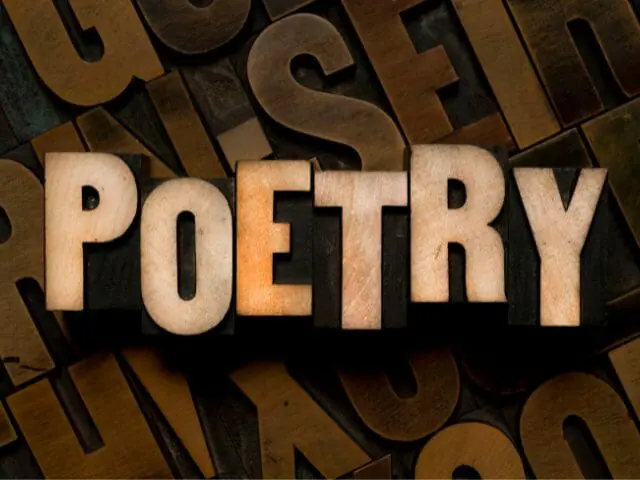
Poetry prompts are a great way to get your students to write creatively. These prompts will help your students tap into their imaginations and write poems that are both beautiful and moving. Whether in free verse or strict meter, your students will be sure to impress you with their poetic prowess.
41. Write about how you’re feeling right now in a haiku .
42. Create a poem in memory of a book, TV, or film character who has died.
43. Choose an onomatopoeia and use it five times in a poem.
44. Consider a metaphor for the current school year and create a poem about it.
45. Write a friendship poem in which every line includes a rhyme for “friend.”
Creative Writing Prompts

Last but not least, creative writing is all about using imagination to create a piece of writing that’s unlike anything else. This creative writing prompts will help your students tap into their imaginations and write some truly unique pieces revolving around self-expression.
46. If I could have any superpower, it would be…
47. Write about a day in the life of your favorite cartoon character.
48. If you could be a historical figure for a day, who would you choose to be?
49. Write a family story from the perspective of your pet.
50. Invent a new holiday and describe how it’s celebrated.
Jump In : Better prepare your 6th graders for this activity by improving their reading comprehension first! Proceed to read my list of fun comprehension exercises here — 11 Fun 6th Grade Reading Comprehension Activities (& Games) .
Dust Off Those Pencils and Get Ready to Write!
While many students lose motivation as their first middle school year goes on, these 50 6th grade writing prompts will help keep them excited about writing all year long. With tons of different genres and modes of writing to choose from, there’s something here for everyone! So get those pencils sharpened and those minds thinking—it’s time to start writing!
Last Updated on July 24, 2022 by Emily
- Pinterest 67
Emily is an active mother of two and a dedicated elementary school teacher. She believes the latest technology has made a huge impact on the quality of early learning and has worked hard to upgrade her classroom and her own children’s learning experience through technology.
Follow her on Twitter , Pinterest , and Instagram for more teaching fun!

Save my name, email, and website in this browser for the next time I comment.

35 Thought-Provoking Persuasive Writing Prompts For 6th Graders

Looking for a solid persuasive essay topic for your 6th grader?
The below post contains tons of great ideas that will get your 6th-grade students thinking, researching, debating, and writing!
I’m not talking about simple opinion writing topics – like their favorite food, favorite book, or how much money they should get for an allowance.
That is the the thing that my 3rd grade student would delight in arguing.
No, sixth graders are ready for more meaty topics that require a bit of research and thought. The more they dig into the topic and refine their point of view, the more they will sharpen their critical thinking and writing skills!
Don’t miss the free pdf printable at the bottom of this page with all of the ideas in one place!
Persuasive Writing Prompts For The 6th Grade Student

1. Is a dress code ever necessary?
In this prompt, students will be asked to take a stance on whether or not they think there is ever a time to enforce a dress code. Are there times when someone should be told how to dress? Such as a school dress code or wedding? Or should people be allowed to dress in any way that expresses themselves or their personality?
2. Should recycling be mandatory instead of suggested?
Students will be asked to consider whether the government should be more aggressive about recycling. They will be working with the concepts of the benefits of recycling vs. the freedoms of people.
3. Should vending machines ban junk food?
6th grade students will be asked to argue for or against the ban of junk food in vending machines. Vending machines are often used by people who are hungry and in a hurry. The vending options are usually less than healthy. Should vending machine owners be required to provide better choices? Or should they be allowed to stock their machines as they see fit?
4. Is it okay to keep exotic animals as pets?
This persuasive topic will have students take a stance on whether or not it is a good idea to keep exotic animals as pets. They will need to consider the benefits and drawbacks of keeping exotic pets and present a strong argument for their position. Make sure the student has a good understanding of the topic and the different types and sizes of animals that some people keep as pets.
5. Should the federal government impose a tax on sugary drinks?
In this prompt, students will be asked to argue for or against a government tax on sugary drinks – similar to the tax on cigarettes. They will need to consider the potential benefits of such a tax. What would the tax money be spent on? Or should people be free to drink any kind of beverage they wish, no matter how healthy or unhealthy?
6. Should life skills be a greater focus for education?
In this prompt, students will be asked to take a stance on what should be taught in school. Should the schools be doubling down on the basics of reading, writing, and math since test scores have dipped? Or should schools start allotting more time for important life skills, like time management, personal finance, and cooking, which are things many young adults struggle with.
7. Should there be age limits to use social media?
Students will list specific reasons why there should or should not be age restrictions for facebook pages and other forms of social media.
8. Is it important to save endangered species?
Students will be asked argue why enndangered animals should or should not be protected. They may be quick to make up their mind, but make sure they do research and find factual reasons that support their opinions.
9. Should video games be considered a sport?
Even though video games do not require the physical activity of traditional sports, does it still require focus, skill, and grit that would make it a modern sport? Or should that title only be awarded to an activity that requires you to sweat?
10. Should there be a ban on plastic bags?
Everyone knows plastic bags are bad for the environment, but should they be banned? What would the alternative be?
11. Is it necessary to have physical books anymore?
In the age of digital everything, are paper books still necessary? College students are already buying digital books instead of expensive physical ones. What benefits would come from doing away with paper books? What drawbacks would there be for those without a computer or solid internet?
12. Is it important to teach physical education in schools?
What is the goal of physical education? Does it have a place in the academic environment of education? Should those things be taught at home or on a sports team instead of during school hours? Shouldn’t physical activity be optional? Or is PE a vital piece of knowledge for a well-rounded education?
13. Should zoos be banned?
Do zoos raise money and awareness for animal conservation…or do they imprison animals for a lifetime that should be free and in the wild?
14. Should recess be scheduled for all kids in school? Even high school students?
What are the benefits of taking an outside break with fresh air for students? Are other subjects too important to sacrifice the time? Could older students be more productive with some sunshine and fresh air during the day?
15. If a student has good grades all school year, should they still have to take standardized tests?
If a student has shown that they are learning and progressing academically, should they have to take a long standardized test? Are there other reasons to take these tests?
16. Is hunting cruel to animals?
Most people buy their meat at grocery stores these days, so is there really any reason to still hunt animals? Does harvesting animals keep humans safe? Or does it make sport of animal lives?
17. Should gas powered cars be outlawed?
Fossil fuels are wreaking havoc on the planet, so should gasoline powered vehicles become illegal? Are electric cars a better option? Do electric cars have any drawbacks?
18. Is a rewards program or discipline more effective to motivate students?
What incentivizes kids to dive into their work, when maybe they don’t want to? Is it a really strong rewards program that will motivate them to finish a difficult task? Or fear of a consequence if they don’t complete their work?
19. Should the United States require military service for men and women, like other countries do?
Many countries require their population to do some form of federal service. America has a draft registration for men, but not for women. Should both genders be required to serve our country? Would it strengthen our nation and our people to have a common experience with service? Or is it unfair to require people to pause their lives for 2 years during the prime of their youth?
20. Should healthcare be free for everybody?
Is it a human right to get healthcare for free? If the patient doesn’t pay, then who should pay for the treatment? What benefits and/or consequences could come from reshaping our healthcare system?
21. Should candy purchases be limited based on how many cavities you have?
Dental health is very serious. Should a kid’s candy be rationed based on their dental records? The more cavities, the less candy you can have – and vice versa?
22. Is it appropriate to let kids work at younger ages, like 10 or 12, if they can do the job?
Many kids today have a strong desire to work, make money, and be successful. We have child labor laws in place to protect kids, but could that be holding them back? If they can do a job, should they be allowed to be hired? Or would that be robbing a kid of their right to a carefree childhood?
23. Should foreign language be required in school or should it be one of the elective courses?
English is spoken nearly worldwide, as it is taught in many countries around the world. What benefits come from learning another language? Should students be able to choose another elective if they don’t want to learn a new language? Or should American children try harder to be multilingual?
24. Should students be allowed to use their cell phones during tests?
You cannot get away from cell phones these days. Even small children have them! They will be a readily available resource in most work places, so shouldn’t they be allowed during tests? Or are memorization and internalization of information important skills for students to learn?
25. Should plastic water bottles be banned?
Plastic water bottles are a huge problem in our environment. Should we outlaw them to help the Earth? What kind of things are one-use water bottles used for that might be important?
26. Is it more important to continue exploration of space or the ocean?
Many wonderful advancements and knowledge have come from space exploration, but we know precious little about our ocean which covers 2/3 of the planet. Should governments be investing money into finding what lies beneath the surface instead of what’s above our heads?
27. Should reading an analog clock still be taught in school?
Digital clocks are everywhere – on your phone, stove, microwave, computer, cable box. Do you really need to learn how an analog clock works anymore? Are there times that digital clocks may not be available? Or are they becoming as archaic as a sundial?
28. Is learning proper handwriting or fast typing more important in today’s world?
Many have stopped learning cursive handwriting, so should schools also stop focusing so much on print handwriting? Should kids be spending that time learning how to type on a keyboard instead?
29. Should the voting age be lowered so elementary school students can vote?
Kids today are developing opinions and beliefs at younger ages and want to be heard. Should we lower the voting age so that children can make more of a difference? Or are most children not quite ready to handle the responsibility of voting?
30. Should AI be allowed in writing school papers if calculators are allowed in math?
Many teachers are concerned about how to tell the difference between an AI-written essay and one written by a student. Should that be a concern? If math allows calculators, can’t English classes allow help from another form of artificial intelligence? What drawback could come from not expecting kids to write their own essays?
31. Are cell phones good or bad for your health?
Cell phones are common around the world now, but are they good for us? How do they benefit our health? How might they hurt our overall health?
32. Should bees become a protected species?
Many scientists have expressed concern about the dwindling number of bees. Should these important pollinators become a protected species like the bald eagle? Or is it unreasonable to expect a person not to kill a bee that is buzzing around them?
33. Is it ever appropriate to ban a book?
Many heated discussions have come up recently about banning books. Is there ever a time that certain books should be kept from kids – like an R rating on a movie? Or should kids be allowed to read whatever they are interested in? Should offensive content be censored or should it be learned from?
34. Should community service be required for kids, middle schoolers and up?
What good could come of requiring community service from children? Or should people only serve because they genuinely want to help their community?
35. Is reading or math more important in today’s world?
Which is a more crucial skill to master? Should kids be focused on reading at the highest levels? Or should they be focused on learning the language of math at the highest levels?
Click Here To Download A One Page PDF Printable Of All The Argumentative Essay Topics

The above text link will take you to a new window where you can download and print the topics today. No email required! Terms of Use : Homeschool, classroom, co-op, and personal use only.
These essay topics will go along with any persuasive writing unit in your writing curriculum ! Let your student go through the list and find the one that really gets them excited.
If you’re looking for more fun writing prompts, be sure to check out the picture writing prompts below. There are 40 images with corresponding text that will get your kid excited to write!

Leave a Reply Cancel reply
Your email address will not be published. Required fields are marked *
6th Grade Essay Prompts: A Comprehensive Guide
By: Author Paul Jenkins
Posted on August 2, 2023
Categories Writing , Education
As a 6th grader, you are at an exciting stage of academic and personal growth. One of the most important skills you’ll develop during this time is essay writing.
Essay writing is an essential skill that will help you communicate your thoughts and ideas effectively. It will also help you develop critical thinking skills, research skills, and creativity.
Essay writing prompts are a great way to get started with essay writing. They provide you with a topic or idea to write about, which can be helpful if you’re not sure what to write about. There are many different types of writing prompts, including narrative, descriptive, persuasive, and expository.
Each type of prompt requires a different approach, so it’s important to understand the different types of prompts and how to approach them. With the right guidance and practice, you can become a confident and skilled essay writer.
Key Takeaways
- Writing prompts are an excellent way to improve your essay writing skills.
- There are many different types of writing prompts, each requiring a different approach.
- With practice and guidance, you can become a confident and skilled essay writer.
33 6th Grade Essay Prompts
Here are 33 essay prompts for 6th grade students:
1. Write about a time you tried something new. What did you learn from this experience?
2. Describe your ideal day. Where would you go, what would you do, and who would you be with?
3. Who is someone you admire? Why do you look up to this person?
4. What is your biggest accomplishment so far in life? Why does it make you proud?
5. What is the most important lesson you’ve learned in school? Explain.
6. What do you want to be when you grow up? What steps will you need to take to achieve this goal?
7. If you could switch places with anyone for a day, who would it be and why?
8. What is your favorite book or movie? Describe the plot and explain why you like it.
9. Describe a challenging situation you’ve faced. How did you handle it and what did you learn?
10. What is one thing you would change about your school? Explain why.
11. What is the most amazing place you’ve ever visited? Describe what you saw and did there.
12. What personal qualities make someone a good friend? Describe a friend who has these qualities.
13. Explain three goals you have set for yourself this year. Why are they important to you?
14. If you could give advice to a younger sibling or friend, what would you say? Why?
15. Describe your favorite holiday tradition. Why is it meaningful to you?
16. What is your favorite subject in school? Explain why you enjoy it.
17. Describe your dream vacation. Where would you go and what would you do?
18. What is a cause you care about? Why is it important to you?
19. What challenges do tweens/teens face today? How can they overcome them?
20. What is one thing that makes you special? How does it impact your life?
21. Describe an act of kindness you did for someone. How did it make you and the other person feel?
22. What is your favorite memory with your family or friends? Why was it meaningful?
23. What is your dream job when you grow up? Describe what you would do.
24. What is a time you made a mistake or failed at something? What did you learn?
25. What are you most proud of about yourself? Explain why.
26. What is your favorite thing to do for fun? Describe why you enjoy it.
27. Pick an inspiring quote. Explain what it means and why it inspires you.
28. Describe a time you stood up for someone else. What motivated you to help them?
29. What are some small things people can do to make the world a better place? Give specific examples.
30. What is one goal you have for improving yourself this school year? Why is this goal meaningful to you?
31. Describe the cover of a book that hasn’t been written about your life. What would the title and imagery represent?
32. What makes you laugh? Describe something funny that happened to you recently.
33. What is one thing you are looking forward to in the future? Why does it excite you?
Understanding Essay Writing
If you’re a 6th grader, you’re just starting to learn about essay writing. Essays are a way to express your thoughts and ideas in a structured way. They can be fun to write, but they can also be challenging. In this section, we’ll cover the basics of essay writing to help you get started.
The Three Parts of an Essay
Every essay has three parts: the beginning, the middle, and the end. The beginning is where you introduce your topic and give some background information. The middle is where you present your arguments and evidence. The end is where you summarize your points and give your opinion.
Writing Skills
To write a good essay, you need to have good writing skills. This means you need to be able to write clearly and concisely, use proper grammar and punctuation, and organize your thoughts in a logical way. If you’re not sure where to start, try reading some essays by other writers to get a sense of how they structure their writing.
Essay Writing Process
The process of writing an essay can be broken down into several steps. First, you need to choose a topic. This can be anything from a personal experience to a current event. Once you have your topic, you need to do some research to gather information and evidence to support your arguments.
Then, you need to organize your thoughts into an outline. This will help you stay on track and make sure you cover all of your points. Finally, you can start writing your essay. Remember to start with a strong introduction, use evidence to support your arguments, and end with a clear conclusion.
6th Grade Writing Prompts
If you’re looking for some ideas to get started with your essay, try some of these 6th grade writing prompts:
- What is your greatest aspiration?
- What do you want to be when you grow up? How will you get there?
- What challenges do immigrants in our country face? What unique challenges do they face living in a new country?
- What is the most important lesson you’ve learned in your life so far?
- Describe a time when you had to make a difficult decision. How did you handle it?
Remember, the key to writing a good essay is to stay organized, use evidence to support your arguments, and end with a clear conclusion. With practice, you’ll become a great essay writer in no time!
Types of Writing Prompts
As a 6th grader, you will encounter different types of writing prompts. Understanding the different types of prompts will help you prepare for the challenges ahead and develop your writing skills. Here are some of the most common types of writing prompts:
Narrative Writing Prompts
Narrative writing prompts require you to write a story or describe an event from your life. These prompts may ask you to write about a personal experience, a fictional story, or a historical event. Narrative writing prompts allow you to use your imagination and creativity to develop characters, plot, and setting.
Expository Writing Prompts
Expository writing prompts require you to explain or describe a topic. These prompts may ask you to write about a process, a cause and effect relationship, or a comparison between two things. Expository writing prompts help you develop your analytical and critical thinking skills.
Creative Writing Prompts
Creative writing prompts allow you to explore your creativity and imagination. These prompts may ask you to write a poem, a short story, or a script for a play. Creative writing exercises help you develop your writing style and voice.
Research Writing Prompts
Research writing prompts require you to conduct research and write an informative essay. These prompts may ask you to write about a historical event, a scientific discovery, or a social issue. Research writing prompts help you develop your research skills and learn how to cite sources.
Reflective Writing Prompts
Reflective writing prompts require you to reflect on a personal experience or a topic. These prompts may ask you to write about your feelings, thoughts, or opinions. Reflective writing prompts help you develop your self-awareness and critical thinking skills.
Procedural Writing Prompts
Procedural writing prompts require you to write instructions for a process. These prompts may ask you to write about how to make something, how to do something, or how to solve a problem. Procedural writing prompts help you develop your organizational and communication skills.
Informational Writing Prompts
Informational writing prompts require you to write an informative essay about a topic. These prompts may ask you to write about a historical event, a scientific discovery, or a social issue. Informational writing prompts help you develop your research and writing skills.
In conclusion, understanding the different types of writing prompts will help you prepare for the challenges ahead and develop your writing skills. By practicing different types of prompts, you will become a more confident and knowledgeable writer.
Developing Writing Skills
In 6th grade, students are expected to have developed basic writing skills, including grammar, punctuation, and sentence structure. However, developing these skills is not enough to become a good writer.
To become a creative and critical writer, students need to practice writing regularly and be motivated to do so.
One way to motivate students is by providing them with interesting and thought-provoking writing prompts. These prompts can help students explore their thoughts, feelings, and ideas and develop their writing skills.
Additionally, writing prompts can help students develop their critical thinking skills by challenging them to think deeply about a topic and express their thoughts clearly.
To develop writing skills, it is important to practice regularly. Encourage students to write every day, even if it is just a few sentences. You can also assign longer writing assignments, such as essays or research papers, to help students improve their writing skills.
In addition to regular practice, it is important to provide students with feedback on their writing. This feedback should be constructive and focus on areas where the student can improve. Encourage students to revise their writing based on feedback and to ask for help if they are struggling.
Overall, developing writing skills takes time and practice. By providing students with interesting prompts, regular practice, and constructive feedback, you can help them become confident and knowledgeable writers.
Topics for Writing Prompts
When it comes to writing prompts for 6th graders, there are a variety of topics that can inspire creativity and help students develop their writing skills. Here are some ideas for different types of writing prompts that can be used in the classroom.
Personal Experiences
One type of writing prompt that can be effective for 6th graders is a personal experience prompt. These prompts ask students to reflect on their own lives and write about a specific memory or experience. For example, you could ask students to write about their favorite book, a memorable experience they had with their family, or a surprising thing that happened to them.
Imaginative Scenarios
Another type of writing prompt that can be fun and engaging for 6th graders is an imaginative scenario prompt. These prompts ask students to use their imaginations to create a story or situation. For example, you could ask students to write about what their future self might be like, what their dream career would be, or what a new holiday they invent might look like.
Current Events
Writing prompts that are related to current events can help students develop their critical thinking skills and engage with the world around them. For example, you could ask students to write about a social media trend that is popular right now, or to reflect on the civil rights movement and its impact on society.

Historical Events
Finally, writing prompts that focus on historical events can help students develop a deeper understanding of the past and its relevance to the present. For example, you could ask students to write about a historical figure they admire, or to reflect on a field trip they took to a historic site. You could also ask students to imagine what it would be like to be the oldest person they know, and to write about their life experiences.
Overall, there are many different types of writing prompts that can be used to inspire creativity and help 6th graders develop their writing skills. By using a variety of prompts that focus on personal experiences, imaginative scenarios, current events, and historical events, you can help students explore different topics and find their own unique voice as writers.
Writing Techniques
As a 6th grader, you will be expected to use various writing techniques to create engaging and informative essays. Here are some techniques you can use to make your essays stand out:
When writing an essay, you can use the plot technique to create a storyline that keeps your readers engaged. You can use the plot structure to organize your essay into a beginning, middle, and end. In the beginning, introduce your topic and provide some background information. In the middle, present your arguments and provide supporting evidence. In the end, summarize your arguments and provide a conclusion.
Descriptive
The descriptive technique can help you create vivid images in the minds of your readers. You can use descriptive language to paint a picture of your topic, such as describing the sights, sounds, and smells. This technique can be especially useful when writing about a place or a person.
Compare and Contrast
The compare and contrast technique can help you analyze two or more things and highlight their similarities and differences. This technique can be useful when writing about two different topics, such as two books or two historical events. You can use a table or a bullet point list to compare and contrast the two topics.
The letter technique can be used to write a persuasive essay in the form of a letter. You can address your essay to a specific person or group of people and use persuasive language to convince them of your point of view. This technique can be especially useful when writing about a social issue or a current event.
Story Starters
The story starter technique can help you come up with an interesting and engaging beginning to your essay. You can use a story starter to grab your reader’s attention and create a sense of intrigue. For example, you can start your essay with a question, a quote, or a surprising fact.
Instructions
The instructions technique can be used to write a how-to essay. You can provide step-by-step instructions on how to do something, such as how to make a recipe or how to play a game. This technique can be especially useful when writing about a practical topic.
The resolution technique can be used to provide a satisfying conclusion to your essay. You can use this technique to tie up loose ends and provide closure to your arguments. You can also use this technique to provide a call to action or a final thought.
Storytelling
The storytelling technique can be used to create a narrative essay. You can use this technique to tell a story about a personal experience or a historical event. This technique can be especially useful when writing about a topic that has an emotional or personal connection.
The Role of Research in Writing
Research plays a vital role in writing, especially when it comes to nonfiction and research writing. As a 6th grader, you will be expected to investigate and use credible sources to support your arguments and ideas.
Research helps you to find and understand information, and it allows you to use that information to write a well-informed and thoughtful essay.
When conducting research, it is important to use credible sources. This means using sources that are reliable and trustworthy. Credible sources can include books, articles, and websites that are written by experts in the field. You can also use primary sources, such as interviews or surveys, to gather information.
As you conduct your research, it is important to investigate natural resources. This includes things like water, air, and land, as well as the plants and animals that live in these environments. Understanding natural resources can help you to write about environmental issues, such as pollution, conservation, and climate change.
When writing your essay, make sure to cite your sources properly. This means giving credit to the authors or creators of the sources you used. You can do this by including a bibliography or works cited page at the end of your essay.
In conclusion, research is an essential part of writing. It allows you to gather information, use credible sources, and write a well-informed and thoughtful essay. By investigating natural resources and using credible sources, you can write about important issues and make a meaningful contribution to your field of study.
Importance of Self-Expression in Writing
As a 6th grader, you are at a stage where you are developing your writing skills and learning how to express yourself through words. Self-expression is a crucial aspect of writing because it allows you to communicate your thoughts, feelings, and ideas effectively.
Writing is not just about putting words on paper; it is about conveying your message to your reader in a way that is clear and concise.
One of the best ways to practice self-expression in writing is through personal narrative and reflective writing. Personal narrative is a type of writing that tells a story about a personal experience. It allows you to share your emotions and experiences with your reader, giving them a glimpse into your life.
Reflective writing, on the other hand, is a type of writing that requires you to reflect on a particular topic or experience. It helps you to understand your thoughts and feelings on a deeper level and communicate them effectively.
Journaling is another great way to practice self-expression in writing. It allows you to write freely without worrying about grammar, spelling, or punctuation.
Journaling is a safe space where you can express your thoughts and feelings without fear of judgment. It is a great way to explore your emotions and ideas, which can help you to become a better writer.
Self-expression in writing is essential because it allows you to communicate your ideas and thoughts effectively. It also helps you to develop your writing skills and become a better writer.
When you express yourself in writing, you are not only communicating with your reader, but you are also learning more about yourself. Writing can be a powerful tool for self-discovery and personal growth.
In conclusion, self-expression is a fundamental aspect of writing, and it is essential for 6th graders to develop this skill. Personal narrative, reflective writing, and journaling are great ways to practice self-expression in writing. By expressing yourself through writing, you can communicate your thoughts and ideas effectively, develop your writing skills, and learn more about yourself.
Understanding Different Essay Types
As a 6th grader, you will be expected to write different types of essays for your assignments. Understanding the different types of essays will help you choose the best approach for your topic and write a well-structured and effective essay.
Narrative Essays
Narrative essays are all about telling a story. They are usually written in the first person and follow a specific structure with a clear beginning, middle, and end. Narrative essays can be based on personal experiences, fictional stories, or real-life events. They are a great way to practice your storytelling skills and engage your readers.
Persuasive Essays
Persuasive essays are written with the goal of convincing the reader to agree with your opinion or take a specific action. They require a clear thesis statement and strong evidence to support your argument. Persuasive essays are often used in debates, speeches, and editorials. They are a great way to develop your critical thinking and persuasive skills.
Argument Writing
Argument writing is similar to persuasive writing, but it focuses more on presenting a balanced argument with both sides of an issue. It requires research and analysis to present a well-rounded and informed perspective. Argument writing can be used in essays, research papers, and debates.
Essay Topics
The topic of your essay is important because it sets the tone and direction for your writing. When choosing a topic, consider your audience, your interests, and the purpose of your essay. Some popular essay topics for 6th graders include:
- The importance of recycling
- The effects of social media on teenagers
- The benefits of reading
- The impact of video games on children
- The role of technology in education
In conclusion, understanding the different types of essays and choosing the right topic is essential for writing a successful essay. Whether you are telling a story, persuading your reader, or presenting a balanced argument, following a clear structure and providing strong evidence will help you achieve your writing goals.
The Use of Technology in Writing
As a 6th grader, you are growing up in a world where technology is an integral part of your daily life. It is no surprise that technology has also made its way into the classroom, including the writing process. The use of technology in writing can be beneficial in many ways, but it is important to understand how to use it effectively.
The internet is a vast resource for information and research. You can use search engines like Google to find articles, videos, and other sources of information to support your writing. However, it is important to evaluate the credibility of the sources you find. Make sure to check the author, publication date, and any biases that may be present.
Cell phones are also a common tool for writing. Many students use their phones to take notes, write reminders, or even draft essays. However, it is important to avoid distractions like social media or texting while writing. If you find yourself getting distracted, consider using an app or website blocker to help you stay focused.
Video games can also be a source of inspiration for writing prompts. Games often have complex stories and characters that can be used as a starting point for creative writing. However, it is important to remember that video games should not be a substitute for reading and writing.
Social media can also be a useful tool for writing. Many writers use social media to connect with other writers, share their work, and receive feedback. However, it is important to remember that social media can also be a distraction. Make sure to set boundaries and avoid spending too much time on social media while writing.
In conclusion, the use of technology in writing can be beneficial, but it is important to use it effectively. Make sure to evaluate sources, avoid distractions, and set boundaries when using technology to support your writing.
Writing about Favorite Things
One of the best ways to get started with writing is to write about your favorite things. This can be anything from your favorite book to your favorite food, animal, or sport. Writing about things that you love can help you to develop your writing skills and express your thoughts and feelings in a clear and concise way.
When writing about your favorite book, think about what makes it special to you. Is it the characters, the plot, or the setting? What emotions does the book evoke in you? Use descriptive language to bring your favorite book to life on the page.
If you’re writing about your favorite food, describe the taste, texture, and aroma of the dish. What memories or emotions does this food bring up for you? Is it a food that you associate with a particular time or place in your life?
When writing about your favorite animal, consider what draws you to this creature. Is it their appearance, behavior, or habitat? Use sensory language to describe the animal and its surroundings.
If you have a pet, writing about them can be a great way to practice your writing skills. Describe their personality, habits, and quirks. What do you love most about your pet?
Writing about your favorite sport can be a great way to explore your passion for the game. Describe the rules, equipment, and strategies involved in the sport. What do you enjoy most about playing or watching this sport?
No matter what your favorite thing is, writing about it can help you to develop your writing skills and express yourself in a clear and concise way. So grab a pen and paper, and start writing about the things that you love!
The Impact of Reading and Math on Writing
As a 6th grader, you may not realize it yet, but reading and math skills can have a significant impact on your writing abilities. Both reading and math are essential components of writing, and they can help improve your writing skills in various ways.
Reading and Writing
Reading and writing go hand in hand. When you read, you are exposed to different writing styles, sentence structures, and vocabulary. You can learn a lot about how to write clearly and effectively by reading different types of books, articles, and essays.
Reading also helps improve your comprehension skills, which are essential for understanding writing prompts and crafting well-written responses.
As a 6th grader, you should aim to read a variety of books, including fiction, non-fiction, and poetry. Reading different genres can help you develop a more diverse vocabulary and improve your understanding of different writing styles.
It can also help you identify different literary devices and techniques that you can use in your own writing.
Math and Writing
Math may not seem like it has much to do with writing, but it can actually help improve your writing skills. Math helps develop critical thinking skills, which are essential for analyzing writing prompts and crafting well-reasoned arguments.
Math can also help you develop problem-solving skills, which can come in handy when you encounter difficult writing assignments.
As a 6th grader, you should aim to develop your math skills by practicing regularly. Math can be challenging, but with practice and perseverance, you can improve your skills and develop a better understanding of mathematical concepts. This can help you become a better writer by developing your critical thinking and problem-solving skills.
In conclusion, reading and math skills can have a significant impact on your writing abilities. By reading regularly and practicing math, you can improve your comprehension, critical thinking, and problem-solving skills, which are all essential for becoming a better writer. As a 6th grader, it’s important to develop these skills early on to set yourself up for success in the future.
Writing about School Life
Writing about your school life can be an excellent way to reflect on your experiences and share your perspective with others. Here are some essay prompts that will help you explore your thoughts and feelings about your middle school experience:
- What is your favorite subject in school? Why do you enjoy it?
- Describe a time when you faced a challenge in school. How did you overcome it?
- What do you think is the most important thing you have learned so far in middle school?
- Write about a teacher who has had a positive impact on your life. What did they do to inspire you?
- Do you think standardized tests accurately measure your knowledge and abilities? Why or why not?
- How do you feel about moving on to high school next year? What are you most excited or nervous about?
When writing about school life, it’s essential to be honest and reflective. Don’t be afraid to share your opinions or experiences, even if they are different from what others might think or feel. Use specific examples and details to support your ideas and make your writing more engaging.
Remember to follow standard essay writing conventions, such as starting with an introduction, including a clear thesis statement, and organizing your ideas logically. Use transitions between paragraphs to help the reader follow your train of thought.
Whether you love or hate school, writing about your experiences can help you gain a deeper understanding of yourself and your place in the world. So take some time to reflect on your middle school years and share your thoughts with others through your writing.
Writing about Society and Culture
As a 6th grader, you are at an age where you can start exploring and writing about societal and cultural issues. One topic that you can explore is the concept of empathy. Empathy is the ability to understand and share the feelings of others.
You can write about the importance of empathy in society and how it can help people understand each other better. You can also explore ways to develop empathy, such as volunteering, reading books, and watching movies that showcase different cultures and perspectives.
Another topic to consider is immigration. You can write about the challenges that immigrants face when they move to a new country. You can explore the reasons why people immigrate, the impact of immigration on society, and the ways in which immigrants contribute to their new communities.
You can also write about the debates surrounding immigration policies and how they affect immigrant families.
When writing about society and culture, it is important to remain neutral and present different perspectives. You can use bullet points or tables to compare and contrast different viewpoints on a particular issue.
This will help you develop a well-rounded understanding of the topic and make your writing more informative.
In conclusion, writing about society and culture can be a great way to explore important issues and develop your writing skills. By exploring topics such as empathy and immigration, you can gain a better understanding of the world around you and become a more informed and empathetic individual.
Writing about Future Aspirations
As a 6th grader, you are at a stage of your life where you are beginning to think about your future aspirations. It’s important to start thinking about what you want to be when you grow up, as this can help you set goals and work towards achieving them.
Writing about your future aspirations can be a great way to explore your dreams and goals. Here are a few tips to help you get started:
1. Think about your future self
When writing about your future aspirations, it’s important to think about your future self. What kind of person do you want to be? What kind of life do you want to lead? What kind of impact do you want to make in the world?
2. Dream career
One of the most common things 6th graders write about when exploring their future aspirations is their dream career. What kind of job do you want to have when you grow up? What kind of work do you want to do? What kind of impact do you want to make in your chosen field?
3. Set specific goals
When writing about your future aspirations, it’s important to set specific goals. What steps do you need to take to achieve your dreams? What kind of education or training do you need? What kind of skills do you need to develop?
4. Be realistic
While it’s important to dream big, it’s also important to be realistic when writing about your future aspirations. Make sure that your goals are achievable and that you have a clear plan for how you will achieve them.
5. Stay positive
Finally, when writing about your future aspirations, it’s important to stay positive. Believe in yourself and your ability to achieve your dreams. Remember that anything is possible if you work hard and stay focused.
Writing about Personal Interests
When it comes to writing about personal interests, the possibilities are endless. You can write about your favorite movie, video game, book, short story, or poem. The key is to choose something that you are passionate about and that you can write about in detail.
To get started, make a list of your favorite movies, video games, books, short stories, or poems. Then, choose one that you want to write about. Next, brainstorm some ideas for your essay.
Think about what you want to say about the movie, video game, book, short story, or poem. What themes or ideas does it explore? What do you like about it? What don’t you like about it?
Once you have some ideas, it’s time to start writing. Begin by introducing the movie, video game, book, short story, or poem. Give some background information and explain why you chose it. Then, dive into your analysis.
Use specific examples from the movie, video game, book, short story, or poem to support your points.
When writing about personal interests, it’s important to be clear and concise. Avoid making exaggerated or false claims. Stick to the facts and use evidence to support your arguments. Use formatting tools like bullet points or tables to organize your ideas and make your essay easier to read.
In conclusion, writing about personal interests is a great way to showcase your passion and creativity. Choose something that you are passionate about and that you can write about in detail. Brainstorm some ideas, be clear and concise, and use evidence to support your arguments.
With these tips, you can write an engaging and informative essay that showcases your writing skills and your love for your favorite movie, video game, book, short story, or poem.
Frequently Asked Questions
What are some creative writing prompts for 6th graders.
When it comes to creative writing prompts for 6th graders, the possibilities are endless. You can encourage your students to write about their favorite hobbies, memories, or even their dreams. Some prompts to consider include:
- Write a story about a magical creature that you discover in your backyard.
- Describe your favorite place in the world and why it means so much to you.
- Write a letter to your future self, detailing what you hope to accomplish in the next few years.
How can reading passages be incorporated into 6th grade writing prompts?
Reading passages can be an excellent source of inspiration for 6th grade writing prompts. You can have your students read a short story or article, and then ask them to write a response or analysis. Some prompts to consider include:
- Write a character analysis of the protagonist in the story you just read.
- Summarize the article you just read and provide your opinion on the topic.
- Write a short story inspired by the themes or ideas in the reading passage.
What are some argumentative writing prompts for 6th graders?
Argumentative writing prompts can help 6th graders develop critical thinking skills and learn to express their opinions effectively. Some prompts to consider include:
- Should students be allowed to have cell phones in school? Why or why not?
- Is it ethical to keep animals in zoos? Why or why not?
- Should junk food be banned from school cafeterias? Why or why not?
What are some fun and engaging writing topics for 6th graders?
To keep 6th graders engaged and interested in writing, it’s important to choose topics that are fun and relevant to their lives. Some prompts to consider include:
- Write a story about a time when you had to overcome a fear.
- Describe your dream vacation and what you would do there.
- Write a letter to your favorite celebrity, telling them why you admire them.
What are some tips for developing a 6th grade writing curriculum?
When developing a 6th grade writing curriculum, it’s important to keep in mind the needs and abilities of your students. Some tips to consider include:
- Incorporate a variety of writing styles, such as creative writing, persuasive writing, and analytical writing.
- Provide frequent opportunities for students to give and receive feedback on their writing.
- Encourage students to write about topics that are meaningful to them.
How can 6th graders be encouraged to write about meaningful topics?
To encourage 6th graders to write about meaningful topics, it’s important to provide them with prompts and assignments that are relevant to their lives. Some strategies to consider include:
- Ask students to write about their own experiences and perspectives.
- Provide prompts that relate to current events or issues that are important to the students.
- Encourage students to explore their own values and beliefs through their writing.
Free Printable Essay Writing Worksheets for 6th Grade
Essay Writing just got more exciting! Discover our collection of free printable Reading & Writing worksheets for Grade 6 students, crafted by Quizizz to enhance their skills and creativity.

Explore Essay Writing Worksheets by Grades
- kindergarten
Explore Other Subject Worksheets for grade 6
- Social studies
- Social emotional
- Foreign language
- Reading & Writing
Explore printable Essay Writing worksheets for 6th Grade
Essay Writing worksheets for Grade 6 are an essential tool for teachers looking to enhance their students' reading and writing skills. These worksheets focus on various aspects of writing, including nonfiction writing, and are designed to help students develop a strong foundation in the art of crafting well-structured essays. By incorporating these worksheets into their lesson plans, teachers can ensure that their students are exposed to a wide range of writing styles and techniques, ultimately improving their overall writing abilities. Moreover, these Grade 6 worksheets also cover essential grammar and punctuation rules, enabling students to write with clarity and precision. In summary, Essay Writing worksheets for Grade 6 are an invaluable resource for teachers who want to foster a love for reading and writing in their students.
Quizizz, a popular online platform for creating and sharing educational content, offers a variety of resources for teachers, including Essay Writing worksheets for Grade 6. In addition to these worksheets, Quizizz provides teachers with access to a vast library of quizzes, games, and other interactive learning materials that can be easily integrated into their lesson plans. By using Quizizz, teachers can create a more engaging and dynamic learning environment for their students, encouraging them to develop their reading and writing skills further. Furthermore, Quizizz allows teachers to track their students' progress and identify areas where they may need additional support or practice. Overall, Quizizz is an excellent resource for teachers looking to supplement their Grade 6 Essay Writing worksheets with additional engaging and interactive content.
Question and Answer forum for K12 Students

Essay Writing Topics For Class 6 Format, Examples, Topics, Exercises
Essay writing topics for class 6 in english.
Writing essays is a crucial part of the academic curriculum for students of all ages. As students progress through their academic journey, the complexity and length of essays increase. Class 6 students are typically expected to write essays that are between 500 and 1000 words long. The essays are usually written in a five-paragraph format and include an introduction, three body paragraphs, and a conclusion. In this article, we will discuss some essay writing topics for class 6 students, along with the English Grammar , format, and examples.
Also Read: Essay Writing For Class 8
Format Of Class 6 Essays:
Before we start discussing the essay topics, let’s take a look at the format of class 6 essays.
Introduction:
The introduction should be a brief paragraph that provides an overview of the topic. It should include a thesis statement that tells the reader what the essay is about.
Body Paragraphs:
The body paragraphs should be three in number, and each paragraph should focus on a specific idea related to the topic. Each paragraph should have a topic sentence that introduces the idea and supporting details that explain and support the topic sentence.
Conclusion:
The conclusion should be a summary of the main points discussed in the essay. It should restate the thesis statement and provide a final thought on the topic.
Essay Writing Topics For Class 6:
1. My Favorite Season 2. My Favorite Animal 3. My Best Friend 4. My Favorite Sport 5. My Favorite Food 6. My School Life 7. My Family 8. The Importance of Reading 9. My Favorite Movie 10. My Favorite Book 11. My Hobby 12. My Role Model 13. The Importance of Discipline 14. My Dreams and Aspirations 15. The Importance of Education 16. My Favorite Holiday 17. My Favorite Teacher 18. My Favorite Place 19. My Favorite Subject 20. My Favorite Color
Examples Of Essay Writing Topics For Class 6:
1. My Favorite Season:
My favorite season is winter. I love the cold weather, and I get excited when the first snowfall arrives. I enjoy making snowmen and having snowball fights with my friends. I also love the holidays that come during winter, such as Christmas and New Year’s. During winter break, my family and I like to go skiing, and we have a lot of fun together.
2. My Best Friend:
My best friend’s name is Sarah. We have been friends since kindergarten, and we have a lot in common. We both love animals and enjoy playing video games together. We also enjoy playing soccer and often compete against each other. Sarah is always there for me when I need her, and I feel lucky to have her as my best friend.
3. The Importance of Reading:
Reading is very important because it helps improve our vocabulary and comprehension skills. It also stimulates our imagination and creativity. By reading, we can learn about different cultures and explore new ideas. Reading is also a great way to relax and escape from our daily stresses.
Recommended Reading: Essay Writing Topics For Class 6
Conclusion On Essay Writing Topics For Class 6:
Writing essays is an essential skill for students to develop, and by practicing writing on different topics, students can become better writers. The above essay topics can be a starting point for class 6 students, and by following the essay format, they can write well-structured essays that effectively communicate their ideas.

- Join for FREE
- Printable Worksheets
- Online Lessons
- Test Maker™
- Printable Games
- Worksheet Generator
- Plans & Pricing
Printable & online resources for educators
- Test Maker TM
- Browse All Questions
- Questions With Images
- Advanced Search
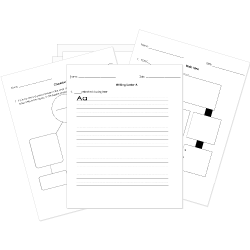
Share/Like This Page
Filter by grade.
You are browsing Grade 6 questions. View questions in All Grades .
Kindergarten Grade 1 Grade 2 Grade 3 Grade 4 Grade 5 Grade 6 Grade 7 Grade 8 Grade 9 Grade 10 Grade 11 Grade 12 Continuing Education
Browse Questions
- All Subjects w/ Images (7032)
- By ELA/Literacy Standard
- By Math Standard
- All Subjects (21117)
Reading Strategies
Conducting research, opinion writing, revising and editing, the writing process, writing essays, writing fiction.
- English as a Second Language ESL (4832)
- Health and Medicine (241)
- Life Skills (33)
- Math (3437)
- Physical Education (218)
- Science (5696)
- Social Studies (4243)
- Study Skills and Strategies (88)
- Technology (48)
Sixth Grade (Grade 6) Writing Essays Questions
You can create printable tests and worksheets from these Grade 6 Writing Essays questions! Select one or more questions using the checkboxes above each question. Then click the add selected questions to a test button before moving to another page.
- be well organized.
- have a topic sentence with supporting details.
- To improve your writing
- To shorten your paragraphs
- introduction
- descriptive
- To test your memory
- To create an outline
- shocking statement
- mystery statement
- rhetorical question
- All at once
- In a series of stages
- The students will rewrite their story and correct their mistakes.
- The students will make a small book out of their story and read it to the class.
- personal opinion
- strong persuasive statement
- on the left of
- Privacy Policy
- Terms of Use
- FREE Printable Worksheets
- Common Core ELA Worksheets
- Common Core Math Worksheets
- Grades 6-12
- School Leaders
Free end-of-year letter templates to your students 📝!
101 Interesting Persuasive Essay Topics for Kids and Teens
Use your words to sway the reader.
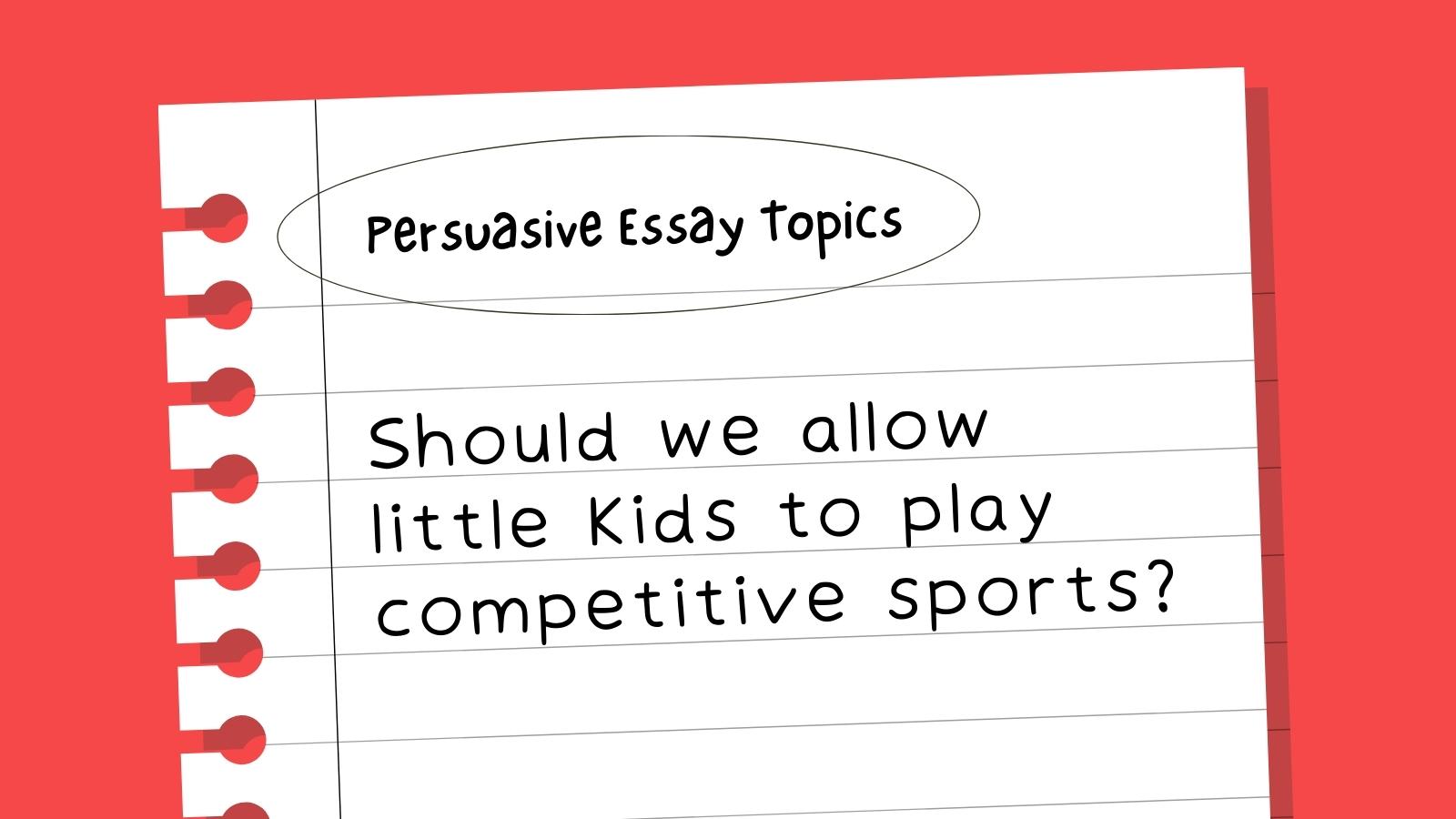
Persuasive writing is one of those skills that can help students succeed in real life. Persuasive essays are similar to argumentative , but they rely less on facts and more on emotion to sway the reader. It’s important to know your audience so you can anticipate any counterarguments they might make and try to overcome them. Try reading some mentor texts to show kids great examples of opinion writing. Then use these persuasive essay topics for practice.
School and Education Persuasive Essay Topics
Life and ethics persuasive essay topics, science and technology persuasive essay topics, sports and entertainment persuasive essay topics, just for fun persuasive essay topics.
- Do you think homework should be required, optional, or not given at all?

- Students should/should not be able to use their phones during the school day.
- Should schools have dress codes?
- If I could change one school rule, it would be …
- Is year-round school a good idea?
- Should we stop giving final exams?
- Is it better to be good at academics or good at sports?
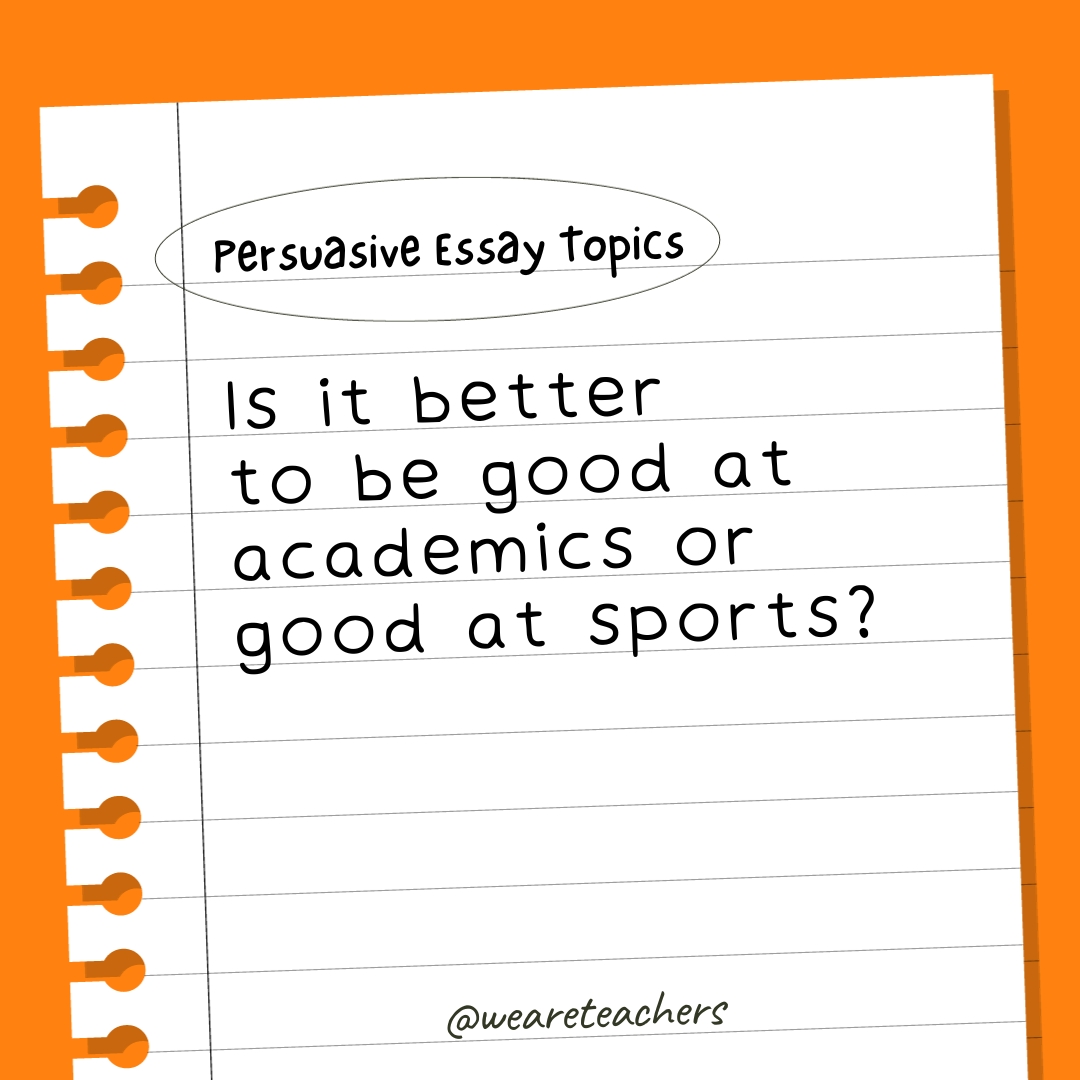
- Which is better, private schools or public schools?
- Should every student have to participate in athletics?
- Do you think schools should ban junk food from their cafeterias?
- Should students be required to volunteer in their communities?
- What is the most important school subject?
- Are letter grades helpful, or should we replace them with something else?
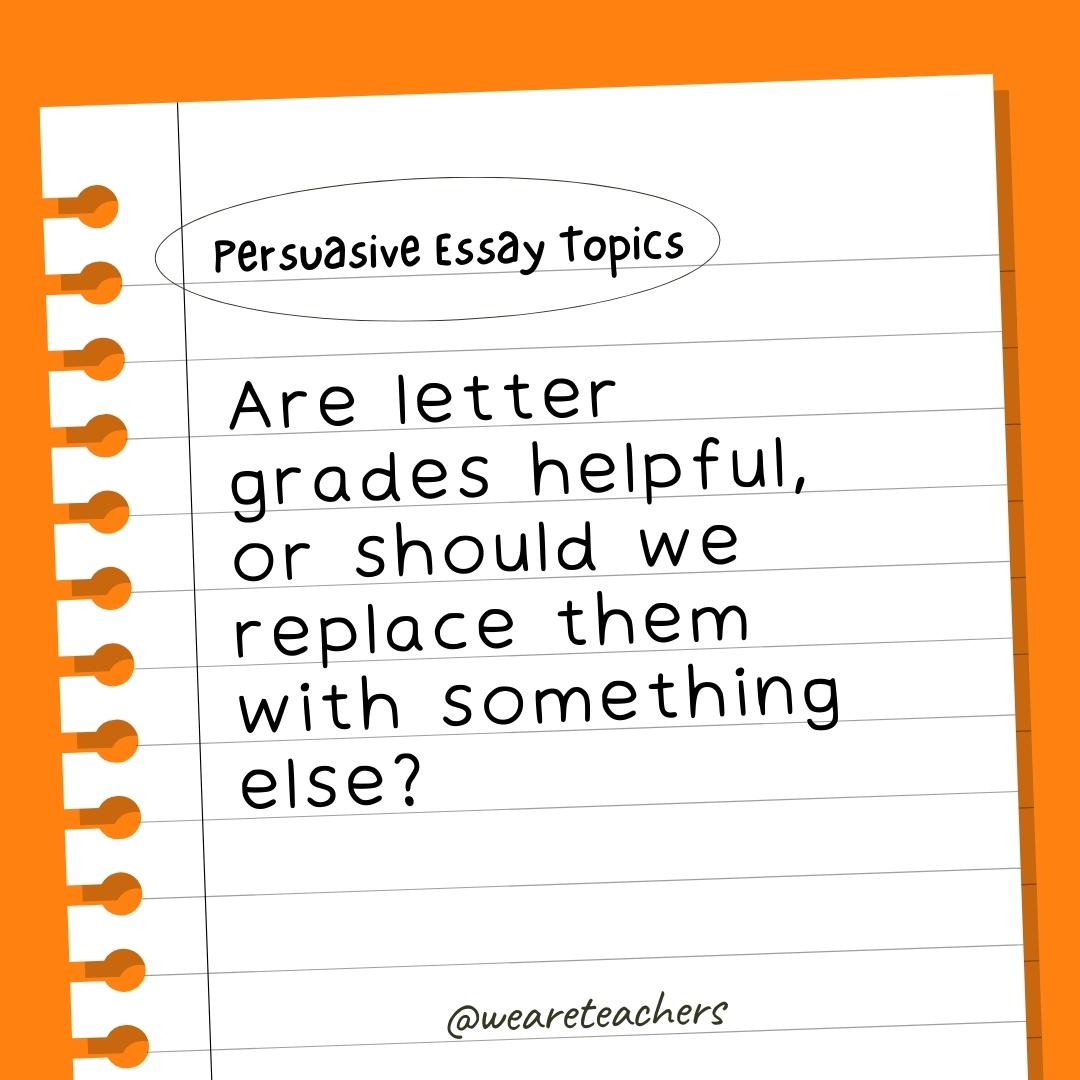
- Is it ever OK to cheat on homework or a test?
- Should students get to grade their teachers?
- Do you think college should be free for anyone who wants to attend?
- Should schools be allowed to ban some books from their libraries?
- Which is better, book smarts or street smarts?
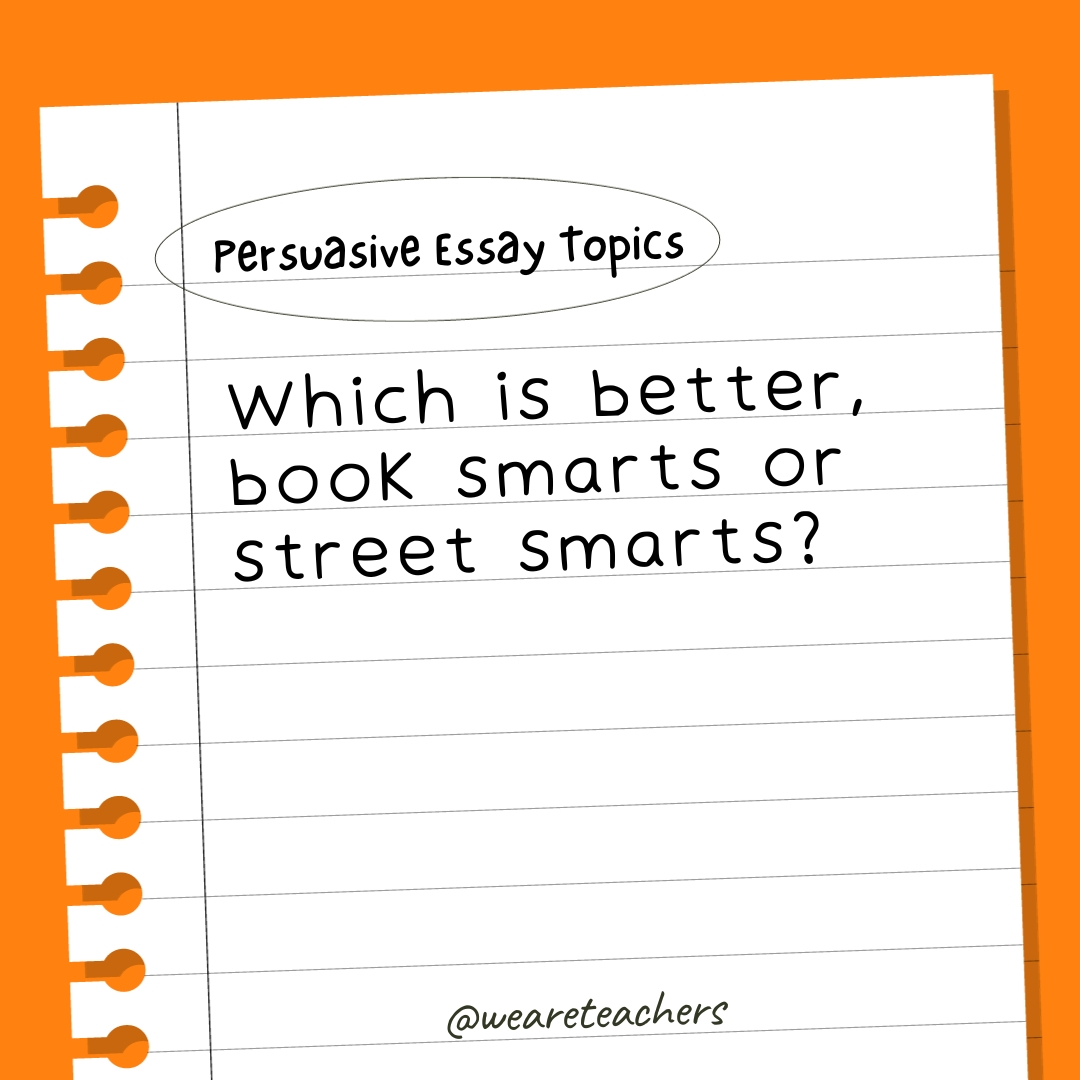
- Should all students have to learn a foreign language?
- Are single-gender schools better or worse for students?
- Is it OK to eat animals?
- What animal makes the best pet?
- Visit an animal shelter, choose an animal that needs a home, and write an essay persuading someone to adopt that animal.
- If you find money on the ground, should you try to find the person who lost it, or is it yours to keep?
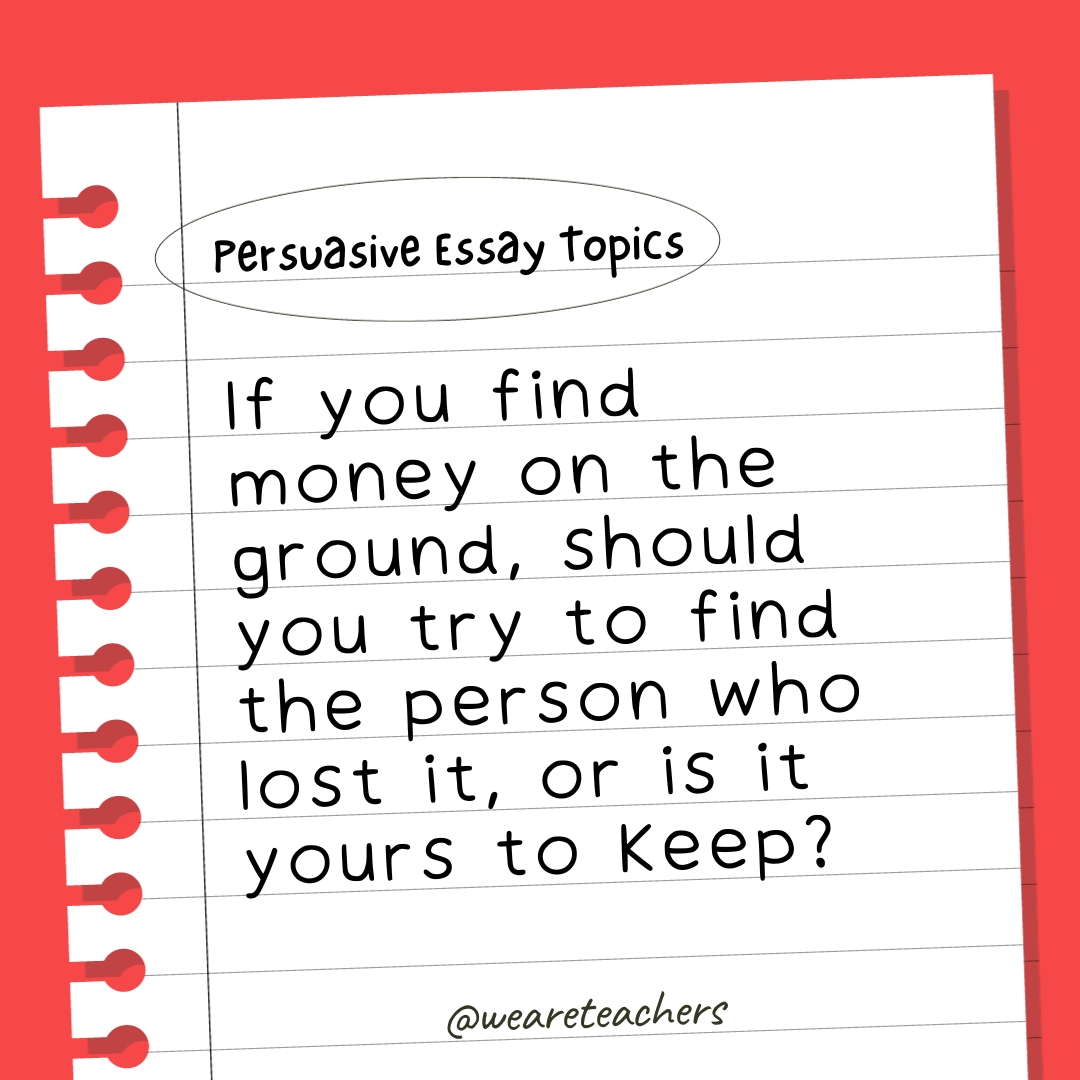
- Who faces more peer pressure, girls or boys?
- Should all Americans be required to vote?
- Is it better to be kind or truthful?
- Which is better, giving or receiving?
- Is it OK to keep animals in zoos?
- Should we change the minimum driving age in the United States?
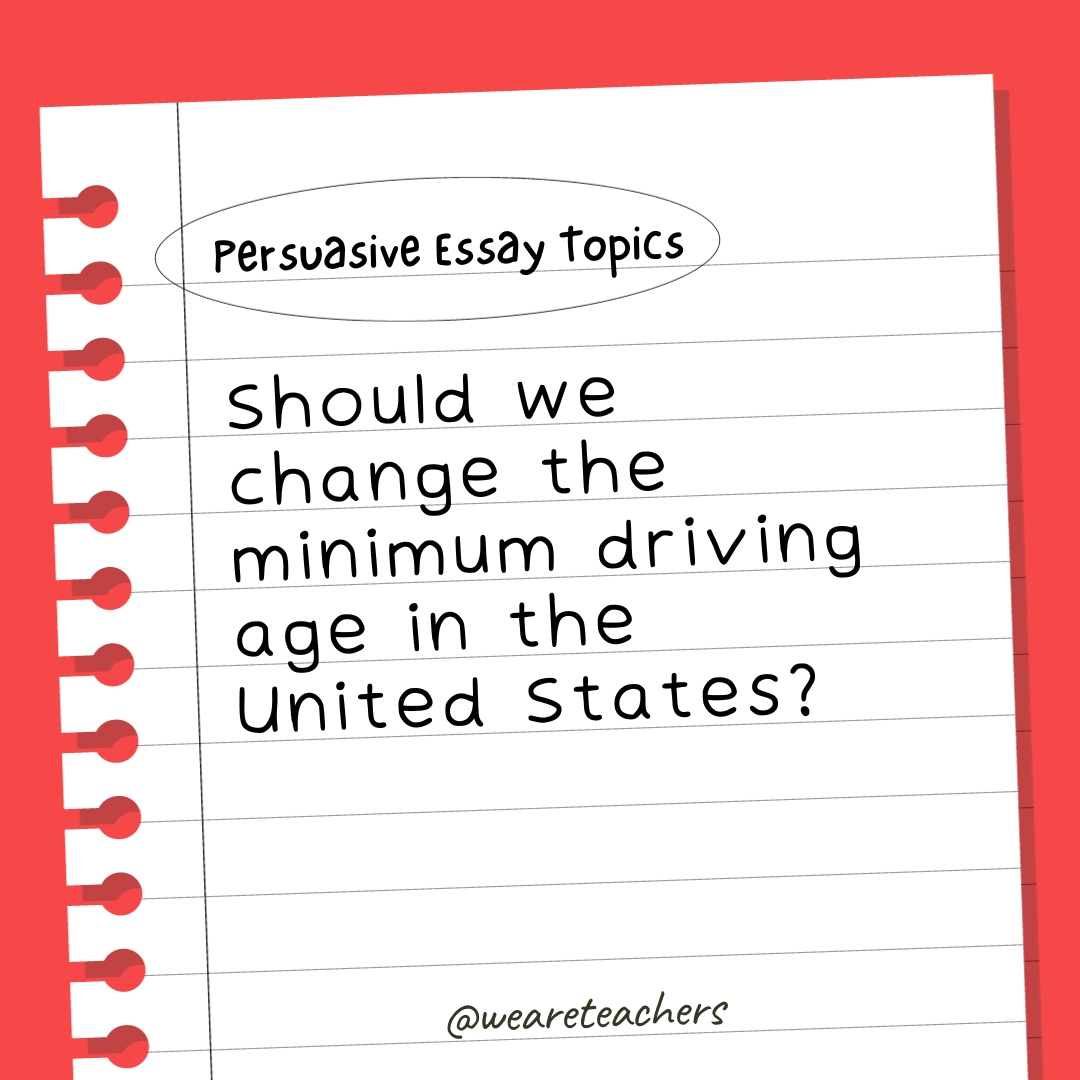
- Which is more important, happiness or success?
- Is democracy the best form of government?
- Is social media helpful or harmful?
- Should parents be punished for their children’s mistakes or crimes?
- Should kids have set bedtimes or just go to bed when they’re sleepy?
- Do you think the government should find a way to provide free health care for everyone?
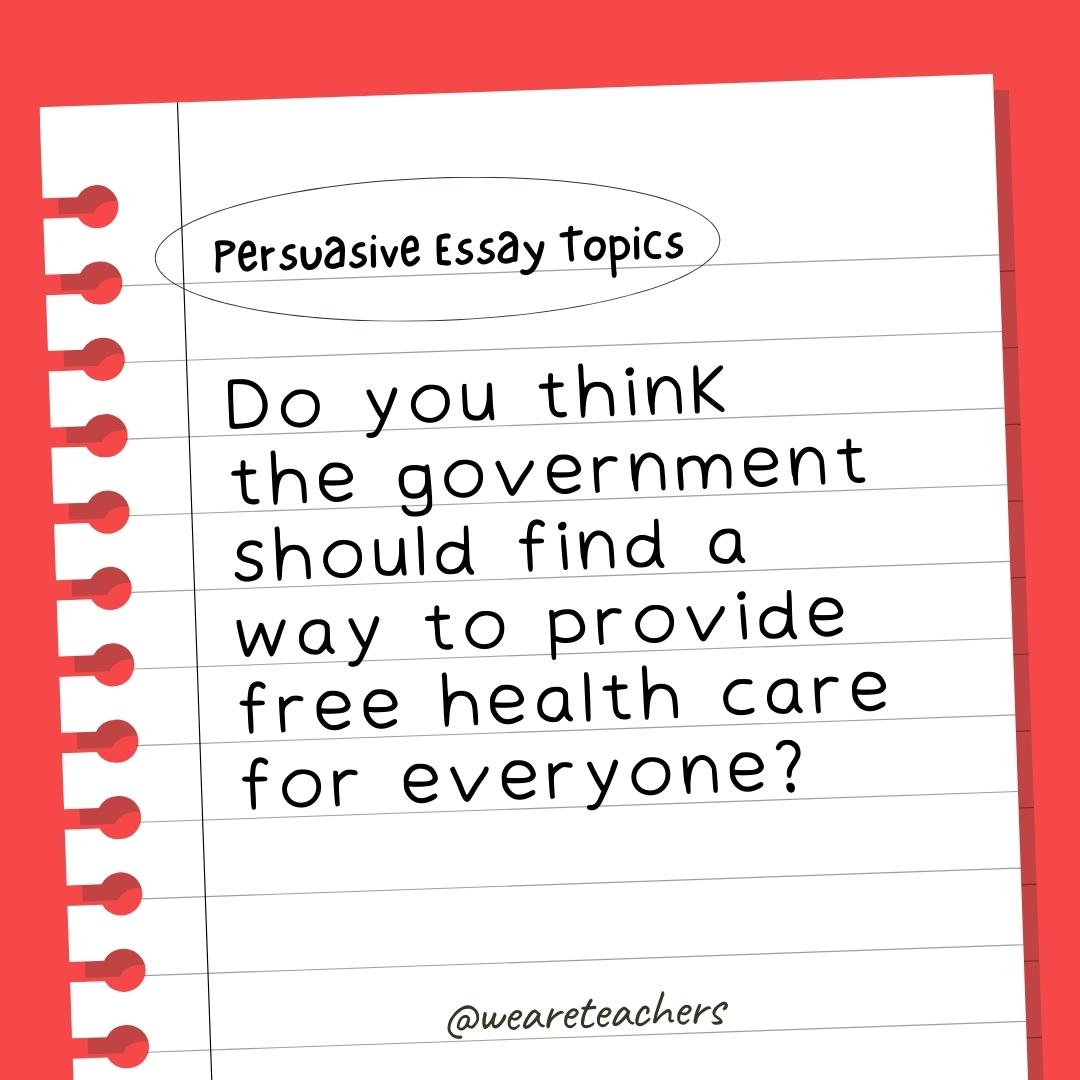
- Is it better to save your allowance or spend it?
- Should we ban plastic bags and bottles?
- Which is better, living in the city or in the country?
- If I could make a new law, it would be …
- Is Pluto a planet?
- Should human cloning be legal?
- Should vaccines be mandatory?
- Is it right for countries to still maintain nuclear weapon arsenals?
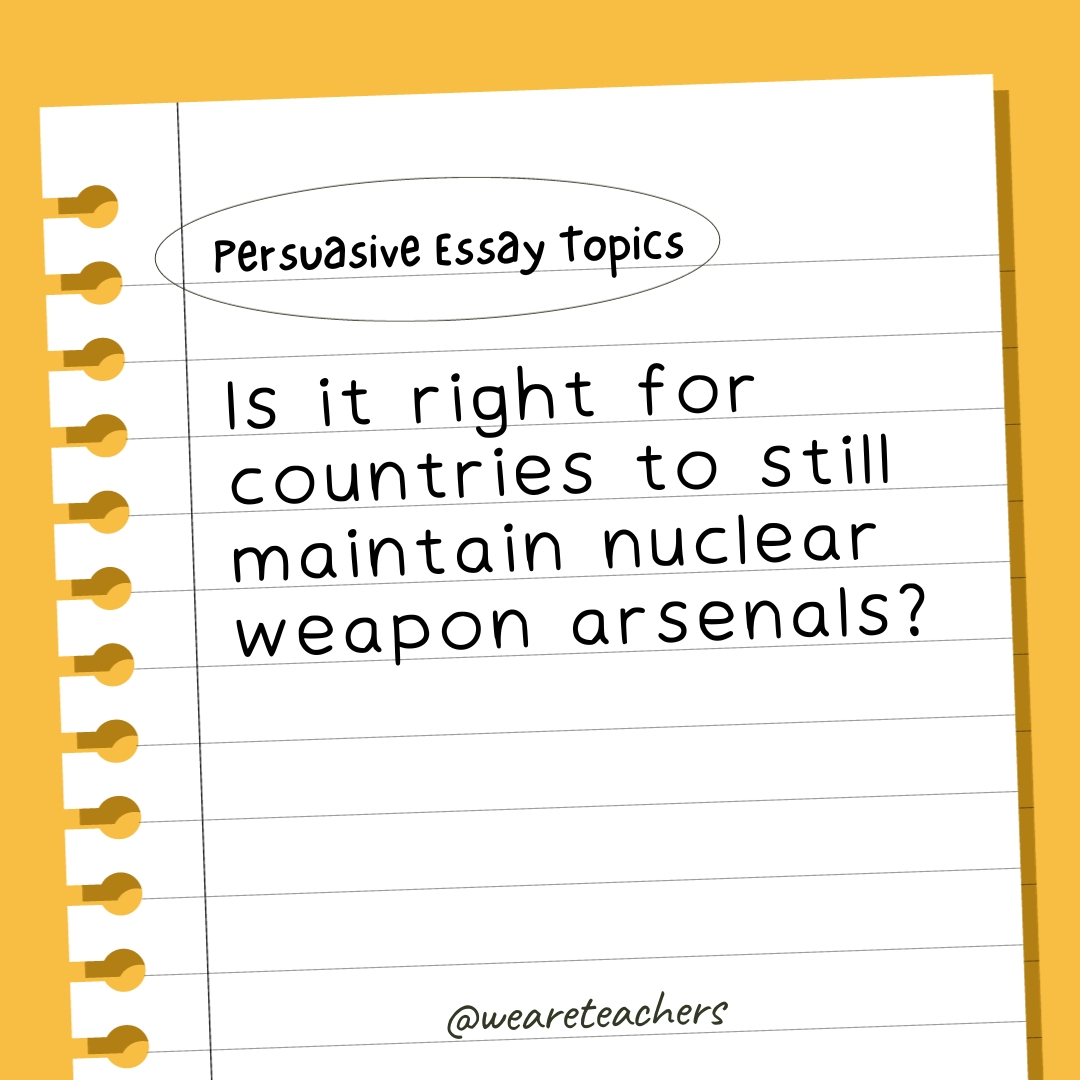
- Should testing on animals be made illegal?
- Will expanded use of artificial intelligence be good for humanity?
- Should all people have free Internet access in their homes?
- Is there intelligent life on other planets?
- Does technology create more jobs than it eliminates?
- Should parents use their children’s cell phones to track where they are?
- Should scientists try to develop a way for people to live forever?
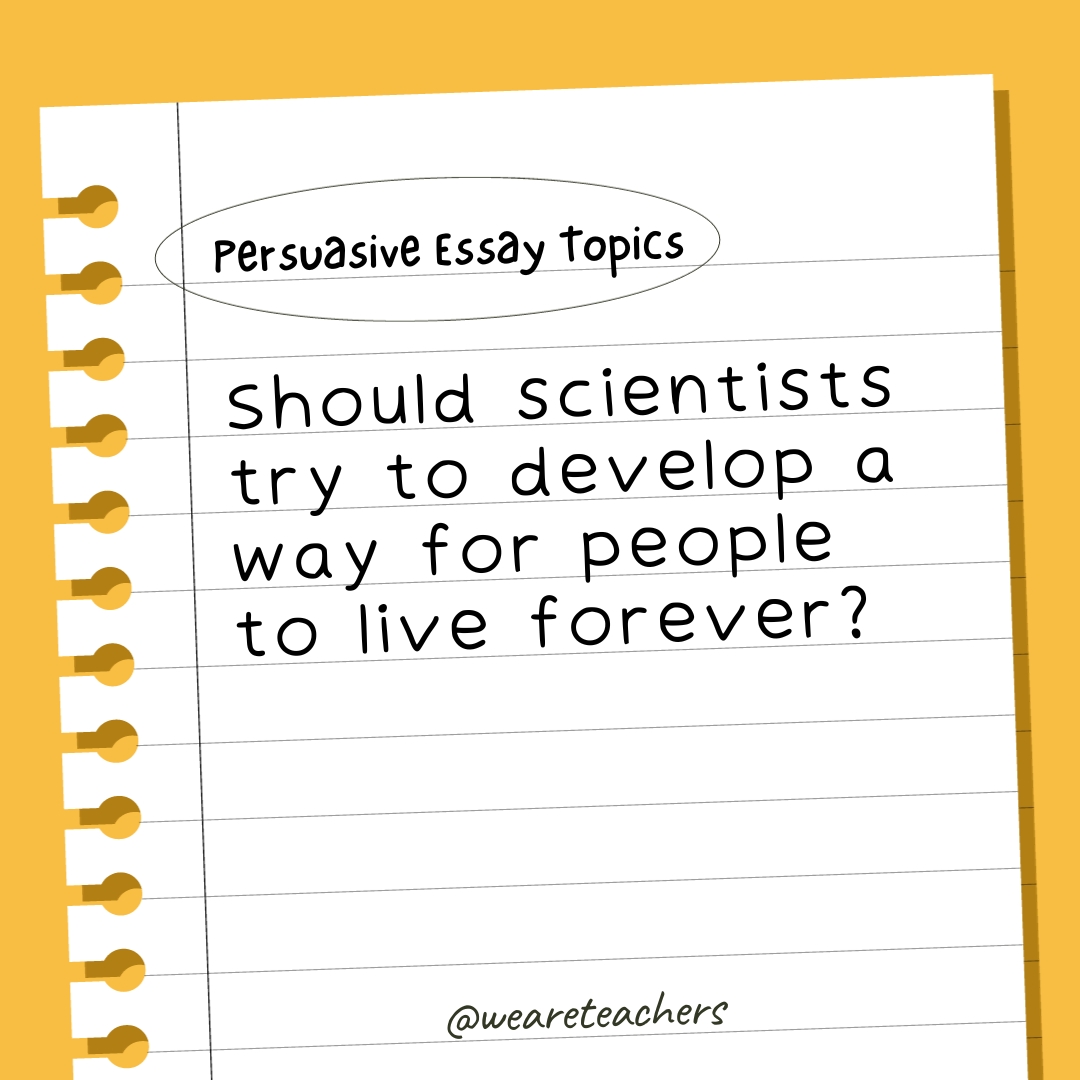
- What’s the best type of smartphone: Android or iPhone?
- Which is better, Macs or PCs?
- Do people rely too much on technology in the modern world?
- Should cryptocurrencies replace cash?
- Should there be a minimum age requirement to own a smartphone?
- Is it important to keep spending money on space exploration, or should we use the money for other things?

- Should kids under 13 be allowed to use social media sites?
- Should we ban cigarette smoking and vaping entirely?
- Is it better to be an animal that lives in the water or on land?
- Should kids be allowed to watch TV on school nights?
- Which is better, paper books or e-books?
- Is the current movie rating system (G, PG, PG-13, etc.) effective?
- Are video games better than board games?
- Should we allow little kids to play competitive sports?
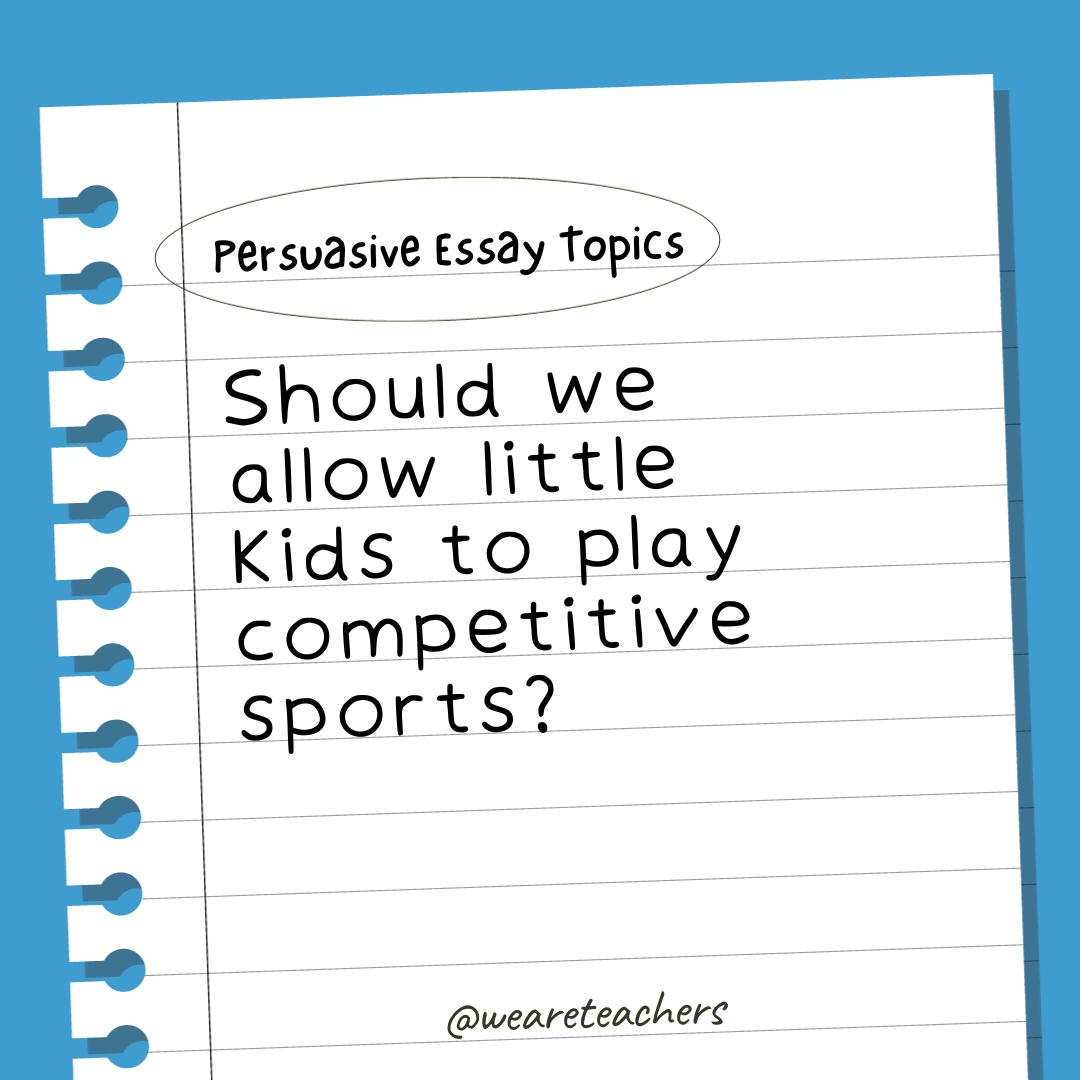
- Which is better, reading books or watching TV?
- Does playing violent video games make people more violent in real life?
- Are graphic novels just as valuable as traditional fictional books?
- Should everyone play on the same sports teams, regardless of gender?
- Choose a book that’s been made into a movie. Which was better, the movie or the book?

- Who is the world’s best athlete, present or past?
- Are professional athletes/musicians/actors overpaid?
- Which is better, fiction or nonfiction?
- The best music genre is …
- What is one book that everyone should read?
- What new sport should be added to the Olympics?
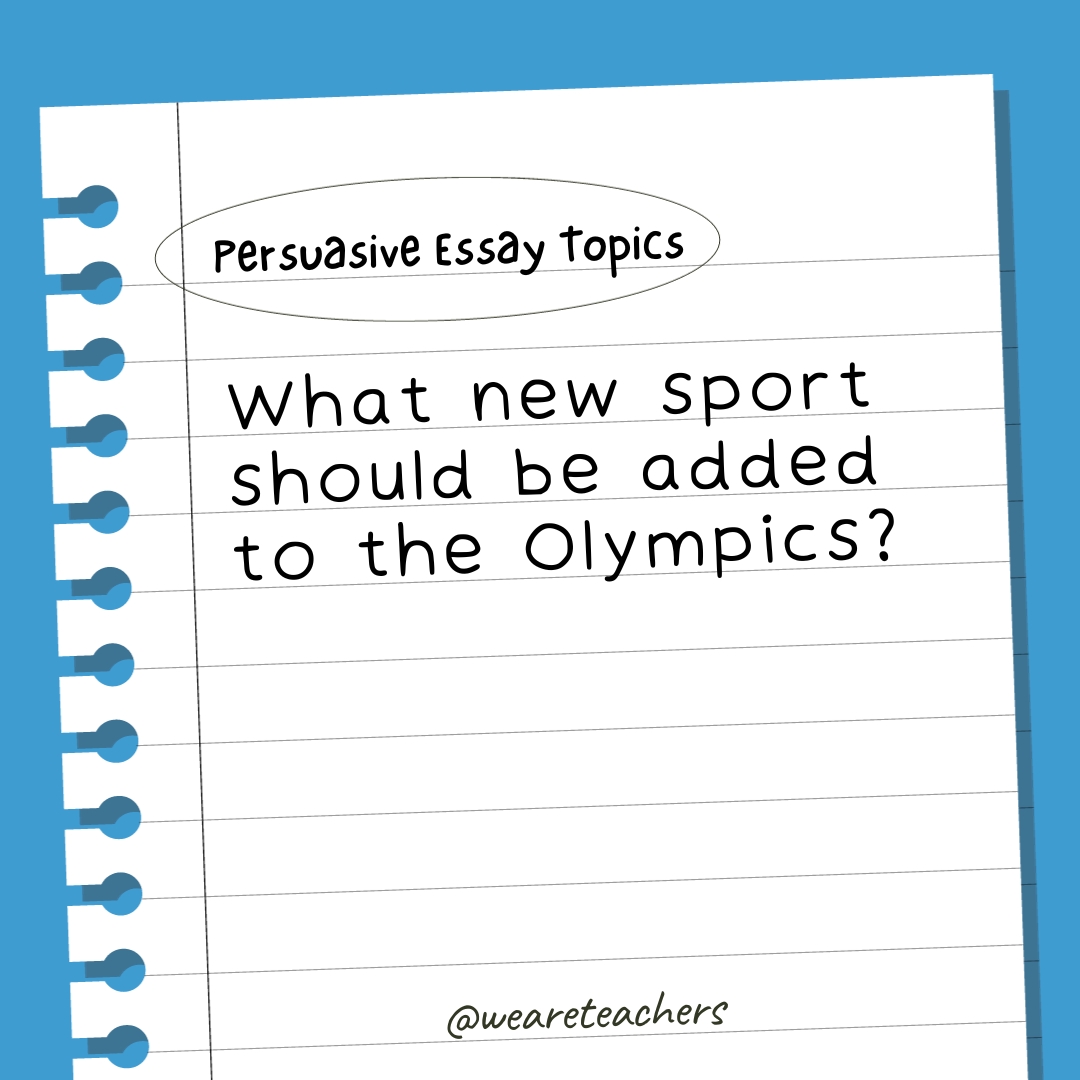
- What’s the best video game system?
- Does playing video games make you smarter?
- Does reality TV actually depict real life?
- Should all neighborhoods have free parks and playgrounds?
- What’s the best holiday?
- The very best food of all time is …
- Which is better, artificial Christmas trees or real ones?
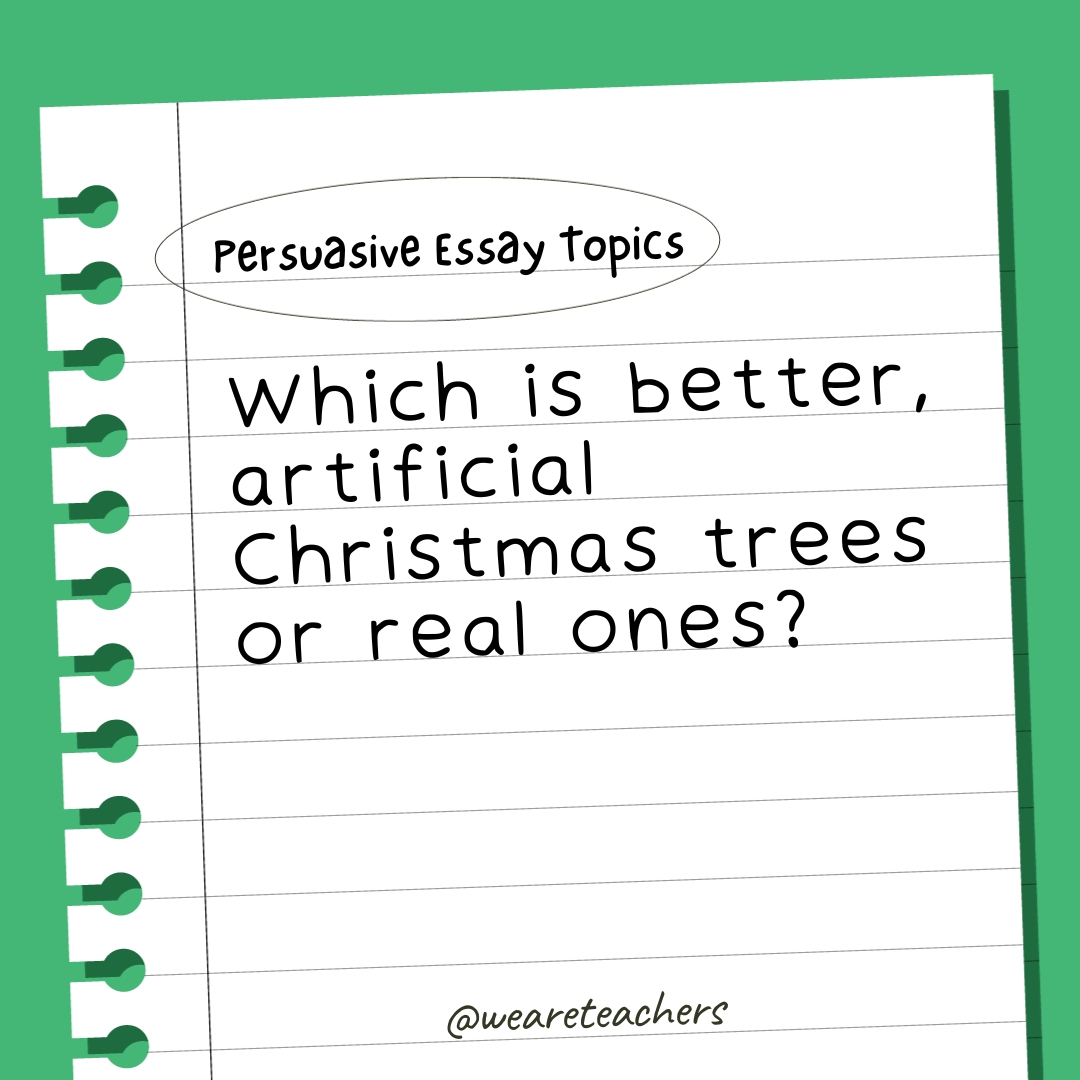
- What’s the best season of the year?
- Should you put ketchup on a hot dog?
- Is a taco a sandwich?
- Does fruit count as dessert?
- Should people have to go to school or work on their birthday?
- Are clowns scary or funny?
- Which is more dangerous, werewolves or vampires?
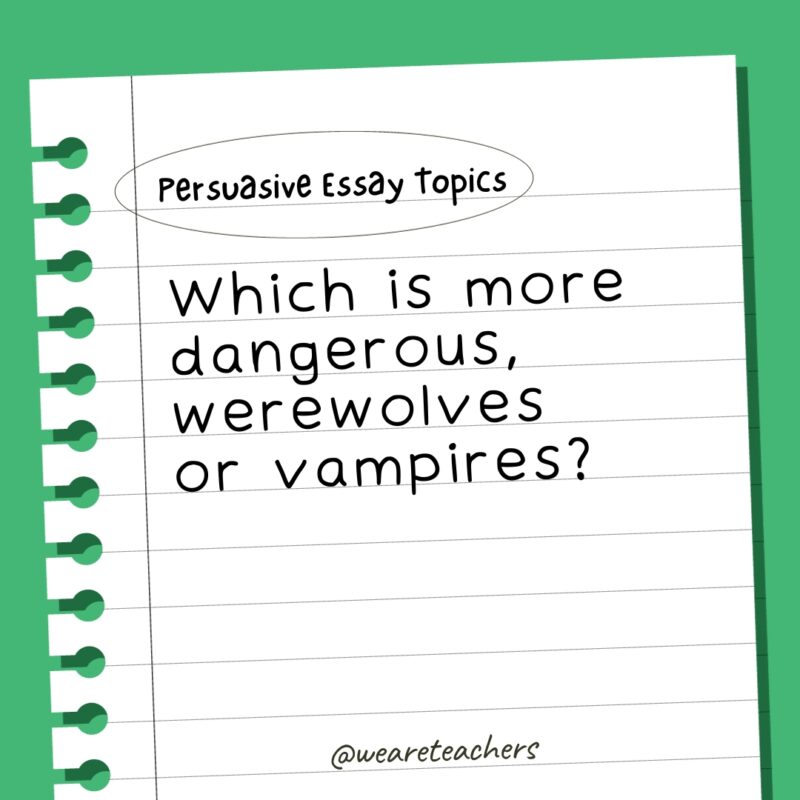
- The best pizza topping is …
- What would be the best superpower to have?
- Should everyone make their bed every day?
- Which came first, the chicken or the egg?
- Should you put pineapple on a pizza?
- Should you eat macaroni and cheese with a spoon or a fork?
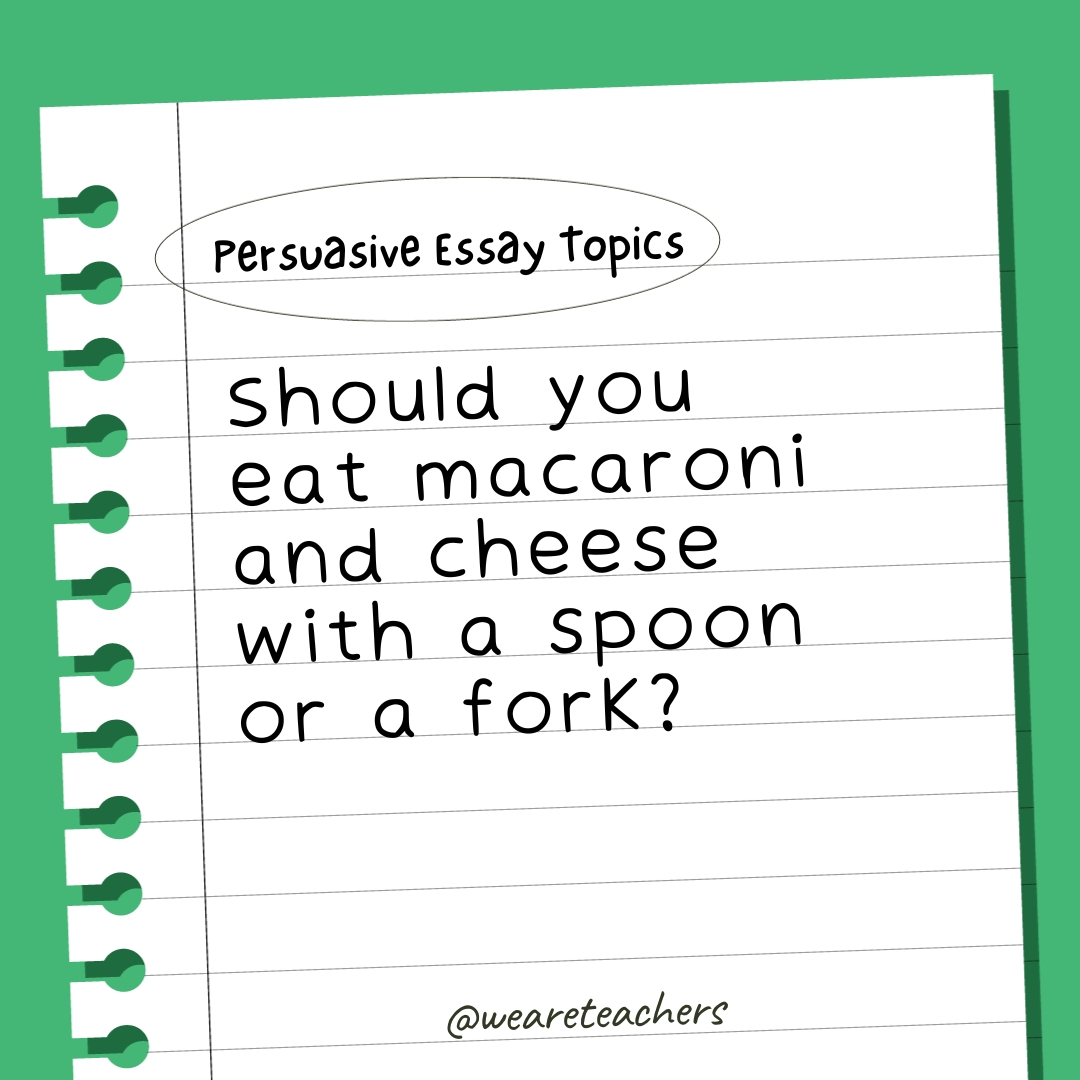
- Describe the world’s best ice cream sundae.
- Is Monday the worst day of the week?
- Would you rather travel back in time or forward in time?
- Is it better to be too hot or too cold?
- Are there aliens living among us here on Earth?
What are your favorite persuasive essay topics for students? Come exchange ideas in the We Are Teachers HELPLINE group on Facebook .
Plus, check out the big list of essay topics for high school (120+ ideas) ..
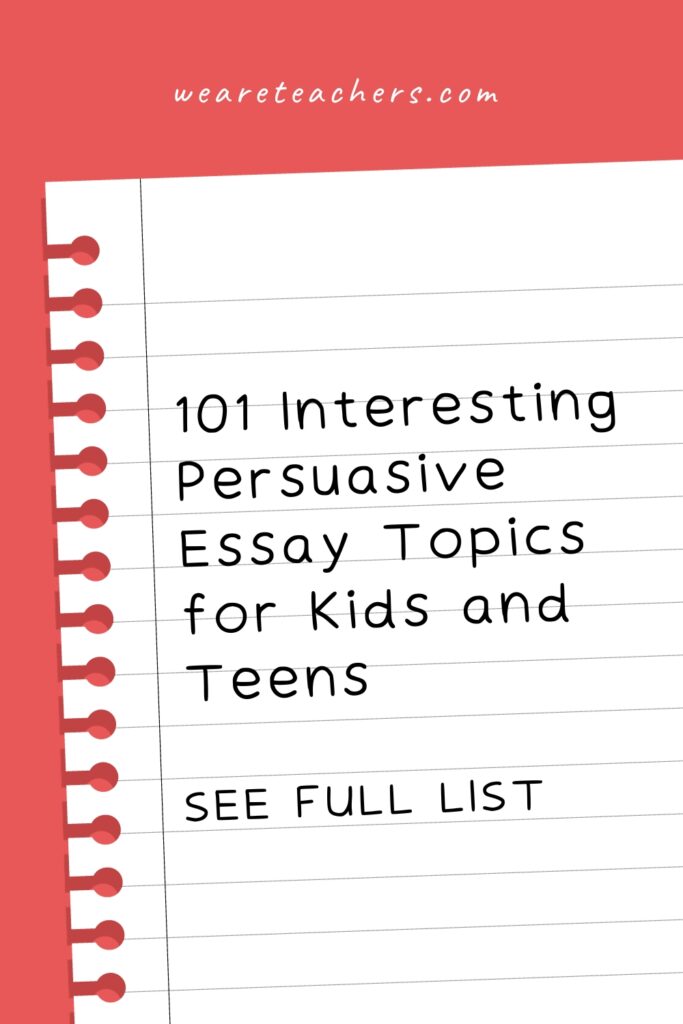
You Might Also Like

The Big List of Essay Topics for High School (120+ Ideas!)
Ideas to inspire every young writer! Continue Reading
Copyright © 2024. All rights reserved. 5335 Gate Parkway, Jacksonville, FL 32256
WorkSheets Buddy
Download Math, Science, English and Many More WorkSheets

Essay for Class 6 Children | Essay Topics for Grade 6 Students in English
Not Everyone can frame their thoughts into sentences and write an Essay. Essay Writing is an art and is a great activity for Kids to enhance their overall personality. Check out Essay for Class 6 Students in English and have an idea on various topics that are commonly asked. Read and Practice Essay Writing Topics and bring out the imagination in you and write Essays on your own. 6th Grade Essays provided here are given by subject experts to make you familiar with essays from different categories.
List of English Essays for Students of 6th Std
If you are looking for a one-stop destination where you can find the Most Common Essay Topics for Grade 6 Students then this is the place. Check out the Essay Writing Ideas from different categories and choose as per your requirement. All you need to do is simply click on the respective topic link and avail the Short or Long Essay in it. You can surely improve your vocabulary and writing skills after referring to the Essays for 6th Class Students.
- Tree our Best Friend Essay for Class 6
- How I Spent Winter Vacation for Class 6
- Christmas Essay for Class 6
- Essay on Republic Day for Class 6
- My Self Essay for Class 6
- My School Essay for Class 6
- My Favourite Book Essay for Class 6
- Essay on Health is Wealth for Class 6
- Essay on Importance of Computer for Class 6
- My Family Essay for Class 6
- Essay on Most Memorable Day of My Life for Class 6
- Essay on Punctuality for Class 6
- Essay on Global Warming for Class 6
- Essay on Importance of Reading for Class 6
- Essay on Child Labour for Class 6
- Unity in Diversity Essay for Class 6
- Essay on Indian Festivals for Class 6
- Essay on Save Electricity for Class 6
- Essay on Library for Class 6
FAQs on Essay for Class 6
1. Where do I get Good Essay Topics for Class 6?
You can get Good Essay Topics for Class 6 on our page through the quick links.
2. How to Improve Essay Writing?
All you have to do is read to plenty of essay topics out there and bring out the uniqueness in you and frame your thoughts into words and write essays.
3. Which is the Best Website that provides Essay Writing Topics of Class 6?
Worksheetsbuddy.com is a genuine portal and go-to place for many any Kind of Essay Topic for Students.
We wish the knowledge shared in Class 6 Essays helped you to express your thoughts. Feel free to use the Comment Box Below and suggest us the topics of your interest. We will look into your suggestions and add them at the earliest. Stay in touch with our site to learn about Essays of Frequently Aksed Topics for School going children.
Share this:
- Click to share on Twitter (Opens in new window)
- Click to share on Facebook (Opens in new window)
Leave a Comment Cancel reply
Notify me of follow-up comments by email.
Notify me of new posts by email.
Writing Castle
essay writing tips
- Online help
- Custom Writing
- Winning college essay topics
- Analysis essay topics
- Argumentative essay prompts
- Cause/effect paper ideas
- Ideas for 6th graders
- Ideas for informative papers
- Writing on gender issues
- Writing on the Hobbit
- Ideas for a rhetoric essay
- Topic ideas on bulimia
- Comparative topics in sociology
- Point of view paper topics
- Ethical evaluation questions
- Environmental pollution problems
- Writing on corruption issues
- Ideas for descriptive essays
- Persuasive writing prompts
- Creating cause & effect paper topics
- 6th grade persuasive paper ideas
- Personal reflective paper subjects
- Romeo And Juliet paper topics
- Facebook argumentative essay ideas
- College informative essay questions
- Argument essay ideas:weapon possession
- History essay titles
- Topics for rhetoric analysis essays
- Argument synthesis essay prompts
- Essay ideas on The Great Gatsby
- Romeo and Juliet: essay prompts
- Fresh essay ideas on global warming
- Cause-and-effect paper topic sentences
- Essay topics on efficient governance
- Year 9 biology essay prompts
- Your school: descriptive paper topics
- Writing ideas for an essay on friendship
- Rhetorical essay examples
- Writing a how-to essay
- Where to look for professional help
- Where to find free samples
- Social Media in 2014 - sample paper
- Pros & cons of writing assistance
- Starting your persuasive paper
- Places to get free examples
- Looking for sample opinion essays
- Descriptive paper samples
- Free short story papers
- Persuasive writing samples
- Writing a cause & effect essay
- Free papers about music
- Creating an evaluation essay
- Art essay sample
- Writing a descriptive essay
- Titanic - sample essay
- Creating a paper on video games
- How to write an illustration paper
- Family Law essay template
- Narrative paper writing basics
- Persuasive essay: knowledge vs. diploma
- Creating an essay for middle school
- Expository essay writing advice
- Getting sample poverty expository essays
- Writing a grade 8 expository essay
- Improving essay writing skills
- Outlining an expository essay
- How to buy papers for sale
- Essay writing on world changes
- Writing an essay on yourself
- Example Master's essays
- Descriptive papers about a person
- Comparative paper conclusion tips
25 Good Persuasive Essay Topics For 6th Graders
The idea behind a persuasive essay is to help the student pass their ideas through to the audience. Even at such an early age, kids today have formed some opinions of the things that they see in the world around them, and it is important to use this as a means to get them to open up. Through a persuasive essay, it is easier to learn what they think, and help them see the world in a better light as they grow up. The following are some of the simplest persuasive essay topics from myhomeworkdone.com that you can choose for 6th grade students:
- Laws should be placed to ban droopy pants
- Snow days are better than sunny days for having family fun
- Having too much money for kids is not a good idea
- Parenting classes need to be administered to all teenagers
- Arts and sciences are supposed to be offered as special degrees
- People who abandon their pets should be charged in jail
- Children who get terrible grades should be encouraged to do better
- Freedom of speech should not have limits
- Homework should be reduced so that kids have more time to relax at home after school
- Advertisements in magazines should not feature skinny women
- A woman president would be better than a male president
- Students should be taught to write more often so that they learn better handwriting
- Etiquette should be taught as a lesson in classes
- There should be a law against spam mail, and huge penalties to those who send them
- Passing into Mexico from America should be easier than it currently is
- Longer hair is better than shorter hair
- It should be illegal to make a racial slur
- Comedians who use foul language to entice their audience should be charged
- Babysitters should be sent to parenting classes
- The world needs to appreciate recycling more often
- Children who read more perform better than children who do not read more often
- Internet access is supposed to be free for anyone who wishes to gain access
- Every student should be allowed to study abroad
- Gun ownership is supposed to be made accessible to most people for security reasons
- The government should stop invading other countries so that we can have more peace and fewer people who hate us.
Essay Guides
- Quality essay writing services
- Evaluation essay examples
- Getting a custom essay
- Harley-Davidson essay sample
- Writing an argumentative essay
- Crafting a leadership paper
- Sample paper on racism
- War Has Beauty: an essay sample
- Crafting a paper step by step
- Media relations essay template
- Mass destruction & terrorism essay
- Technology paper sample
- When you have an hour left
- Choosing your agency
- 5 reasons to get help online
- Understanding the essentials
- Literary essay examples
Online Help
- Pimp my paper
- Writer jobs from home
© WritingCastle.net. All rights reserved.

- Mar 24, 2021
Essays in 6th Grade: A Basic Format that Elevates the Standard 5-Paragraph Structure

6th grade is such a funny year. Funny haha and funny weird. Student writing levels are all over the map. You will have students coming to you writing on a very elementary level, still needing loads of help with grammar and paragraph formation. Then, you will have students ready to write critique pieces and analyses. How do you navigate this? Read to find out more!
Give Them a Format...to Start
I've learned that 6th graders still need format . They still need structure. They still need checklists. As much as I loathe limiting them in this way, I think it is very reassuring to them. That's not to say you can't tweak for the strong writers, but I do still feel they need it.
For my students in particular, I like to let them dabble in looser formats of non-fiction writing in other ways. They do book reviews , a debate , podcasting , etc. They are offered choices in reading responses to non-fiction reading and analysis, too. My classes actually write digital eBooks, too. But on the whole, they are expected to write two essays with a very similar format twice a year.
Bye-Bye 5-Paragraph Essay
Alright, so this is kind of not totally true. My students do end up writing 5 paragraphs, but that typical structure we all commonly know, I navigate away from. I think it's a fine format, but as they get into middle school they are expected to compare a LOT more and not focus on one specific topic . They are expected to follow through on a thread, a claim, a theme, an idea and how it is shown in various sources. And this is super new for them, analyzing various sources on the same concept. They really need a structure for this.
So, the typical essay, before they get to me, goes like this, and it is a good precursor:
Introduction that states your thesis and 3 major reasons to support your claim.
Conclusion that looks a whole lot like the introduction.
This format does not allow analysis of multiple sources and if you throw in other sources, it gets messy. Instead, I gear my students to focus on each source separately, then comparing them all.
The Format that Works (Research and Literary Analysis)
First of all, it's important to know what essays I actually do with my kiddos. I do a research unit. This changes almost every year, but typically they choose some kind of topic, I group them based on their topic choice. First, they do research (non-fiction skills) using a book, article, and video. They then use those sources to write an essay on a claim they make based on their topic. Later, they make eBooks in groups based on their topic.
The other essay I do is Literary Analysis . This follows a dystopian unit . They read a dystopian book in book clubs. Then, I have them choose from a short list of short stories that are dystopian. Lastly, we watch the movie The Truman Show . (This year I had them watch "The Scarecrow" on YouTube since we were hybrid due to the pandemic). They then determine a theme that is true for all three sources and write an essay based on that theme.
This essay format works for both of these essays. So here it goes!

Introductory and Conclusion Statements
In a traditional essay, students have to write a hook, their claim/thesis, and essentially ANOTHER three sentences that state what their essays will be about. In my opinion, all of this is completely unnecessary. How many times do you read introductions in books? Okay, real avid readers do, but in reality many people don't. So for these, I tell my students to get right to the point .
Here's what should be in their introductory and conclusion statements:
A statement that introduces the topic. (This is a hook of some kind. I sometimes tell them to start it with "in our world..." or "in our lives..." and something that relates to their topic. Or just starting it with their topic and explaining what it is.)
The claim/thesis.
A statement that references there are differences and similarities in the sources. (For example: "[Title of sources] support this claim in different and similar ways." That's it.)
This all ends up being 2-3 sentences.
Topic Sentences
I have my students start their essay prep with topic sentences. This helps them get a sense of where their essays will go.
The big thing to understand here is how the paragraphs are set up .
Body #1 : Focus on source #1 and how it shows claim/thesis.
Body #2 : Focus on source #2 and how it shows claim/thesis.
Body #3 : Focus on source #3 and how it shows claim/thesis.
Body #4 : Focus on how ALL SOURCES show the claim/thesis in the same way.
So they start with creating topic sentences for those paragraphs. Each topic sentence is set up like this. The last topic sentence would start with "all sources..." instead of "source title".:

Body Paragraph Format
In the picture you see below, I have specific colors for specific aspects of body paragraphs. ALL body paragraphs follow this format in that exact sequence/order. I will be completely honest, I don't give them a ton of wiggle room since this is pretty new to them. However, my stronger writers dabble in mixing evidence stems and elaboration stems around.

Their paragraph starts with the topic sentence they already prepared. From there, the next sentence begins with an evidence stem . Here are a few examples of evidence stems:
According to the text,
The author states,
In [title],
Right after the evidence stem, in the same sentence, they add their text detail to support their topic sentence. I encourage them to quote exactly from the text for most text details. They can paraphrase, too, but should really try to get exact lines.
In regards to quoting, I also mention to them not to quote plop . I made this up. I plan on making a product for this at some point. A quote plop is bad . It's when students take a line from the text and just plop it in their essay. I show them how to break up the quote from the text with their own words.
So, a first sentence may look like this: According to the text [evidence stem, highlighted green] , when Luke was hiding due to being a third child, "they took the woods away" , [text detail with context, a.k.a. not just plopping the quote in the sentence, highlighted yellow].
Directly after that sentence should be an elaboration stem with an elaboration explaining how the text detail shows their claim/thesis. Students highlight this entire sentence in blue and their claim within it dark blue. Here are some elaboration stems:
This proves [claim] because...
This shows [claim] because ...
After that they do the same process two more times; two more text details with elaborations. Lastly they do a closing sentence .

Comparison Paragraph: This is set up almost exactly the same, except the focus is on how ALL the sources show the claim in the same way. They then provide a NEW text detail from each source to prove how the claim is being shown similarly in each.

Once all their body paragraphs are written, I have them go review their introductory and conclusion statements, put everything into a final draft and leave the highlights in the essay . This helps them visualize all the components and helps me grade!
For revision, the focus is on not quote plopping, being sure their details support their thesis, changing up the wording of claims/theses, and rearranging for strong writers.
Bottom Line
While this is very limiting for some, it is super helpful for struggling writers. Having that checklist and having the highlights helps students visualize what they need to compare sources in an essay format.
I'd say it'd be great to introduce this in 6th and by 8th, they can certainly make these more interpretive, creative, and unique.
You can find a lot more detail about this in the product below . What you see here is only a taste. This contains a full sample essay, checklists, tips, and more. You can also edit it to meet your needs.

************
Want a custom bundle from me click below.

Teachers Pay Teachers Store
Recent Posts
Spring Things! Fun with Poetry and Figurative Language
Text Structure Explanatory Writing: Creating a Dodecahedron
Why I Don't Do a Daily Reading Log: What I Do Instead
Really interesting - thank you!!
This exactly the kind of thing I've been looking for, and even better! I love your approach and it's so well explained. I couldn't disagree more with any of the negative feedback to this article. I think it's perfect for my style of teaching and my standard of writing. Most of all, the way you explained this and broke it down into small steps will make it so achievable for even lagging students to develop great writing skills and feel confident in the process! You nailed it. Thank you so much!
I read all the essay writing format instructions. All the points are useful for any kind of essay writing. But at the age of high-level essay writing learners need to be essay writer experts like the 6 Dollars Essay Website , ready to do professional essay writing for any essay grade.
This is beyond me and I teach HS English. Where does this lady teach, at Princeton? I do not know any 6th grader that does this or would understand this. I see why so many of our young people have become disinterested in the learning process. I also see why so many teachers quit. The profession is stale, boring, and antiquated. This article was not fun to read and I'm thinking this new 5 paragraph writing style would be a drag for the average ela teacher to teach.
. In the blog post, I mention the various types of writing I do with students. I also have other blog posts that discuss these other formats. This is not the end all be all. In my over a decade experience with teaching writing, having a structure helps struggling writers. This is not a writing style. This a format for one type of writing. As teachers, we should be offering all types of formats, especially with younger writers who are still learning how to write.

66 Opinion Prompts for 6th Grade
Everyone knows that sixth graders are full of opinions, especially their teachers and parents.
These prompts are written as questions to let your students decide the answer and describe why they have a strong viewpoint. Channel that creativity and persuasion skill by having your sixth graders write to convince you why they have the correct opinion, and let the fun begin.
How to Use the Prompts
These prompts may be used by throwing them all into a jar and letting students pick one out and write about it, or maybe let them choose two and pick one they have stronger feelings about.
You also may think about letting the students pick whichever prompt they like the best, and then you can get them to be even more open with their opinions.
Here are the prompts:
- What is the best animal to have for a pet?
- Can being honest be a bad thing sometimes?
- Do you know that there are thousands of ice cream flavors? What is your favorite and convince us why it is the best?
- What is your favorite color, and why is it better than other colors?
- Explain why sunny weather is better than snow or vice versa.
- Discuss the current homework situation and how it could change for the better for everyone.
- What rules at school would you change and why.
- Describe when and why it is okay to tell a lie. Or if it is ever okay.
- They are banning sagging pants. Why or why not?
- Why should students be taught handwriting again?
- What is the most important subject to learn in school?
- Who is the best professional athlete?
- Who is the best president we have had?
- Describe the ways you think school lunch should be changed.
- Discuss your favorite book. Include the things that you feel make it the best book you’ve ever read and try to encourage someone else to pick it up and read it.
- If you were a fashion designer, would you want skinny models? Why or why not?
- What are the drawbacks of the celebrities we see everywhere?
- Who is your favorite actor or actress. <make an argument for why they deserve an Oscar.
- What should be done to prevent school violence?
- How often should you make a new friend and why?
- Do you believe in karma?
- Where is your favorite vacation place? Why is it the best?
- What is the meaning of freedom of speech?
- Why is having an opinion important?
- What is the weirdest thing you have ever written a story about in school?
- Do you like to dance in public? Why or why not?
- Should school have more art projects and less math?
- What do you want to do more of when you get older?
- What is the best extracurricular offered at your school? What makes it the best?
- What is the greatest sport?
- Do you think that pineapple on a pizza is delicious?
- What would you wear to school if you could wear absolutely anything and why?
- What is your favorite Disney movie ever? Explain why it is better than any other Disney movie.
- Do you believe in magic? Why?
- Choir or band? Who are the ultimate music nerds, and what makes them better at making music?
- What is the best part about winning at something?
- How would you prevent bullying in school?
- Why is it wrong to treat other people without kindness?
- Who is your hero? What makes them heroic? Why do they make you admire them?
- Why do you believe opinions are important for everyone?
- What do you like learning from someone else’s opinion on a subject?
- Do you believe that kids have it harder today or twenty-five years ago?
- What do you think is the most important meal of the day?
- Do you believe in ghosts? Have you seen one? What would happen if everyone saw ghosts?
- How would the world change if governments decided to stop going to war and decided to treat everyone well and be respectful?
- Is long hair or short hair better?
- Do you think we should still be allowed to keep animals at the zoo?
- How would you stop someone from making a bad decision? How do you decide if the decision is bad?
- Should everyone get a participation award? Why is it important to understand how to lose?
- Why should you always do your homework?
- It’s crucial to stop watching so much television and get outdoors. So what are the health benefits of being more active?
- Why should life be more like a Disney show? Should you learn helpful lessons in an easy-to-swallow package, or should you go through the hard work of figuring it out yourself?
- What is your favorite fast food place?
- Do you think every student should take art?
- Why knowing how to cook important for everyone?
- Do our pets dream as we do?
- Are video games and eSports real sports?
- Why is it essential to go to college after high school?
- Do you think everyone should be vegetarian?
- What would the climate look like if no one drove cars anymore?
- How is the environment important?
- Why do we need bees and other bugs?
- Do you think that unicorns and other mythical creatures might be real?
- Why do kids need cool shoes?
- Describe your favorite classroom activity.
- The most exciting thing about being a sixth-grader.
Looking for More?
If you liked these prompts and are in search of more great writing inspiration, remember to bookmark our website – and take a browse around!
We have plenty more prompts as well as other excellent resources for education.
If you have any thoughts on something you think we overlooked, or maybe have a resource we missed, please feel free to drop us a line anytime.
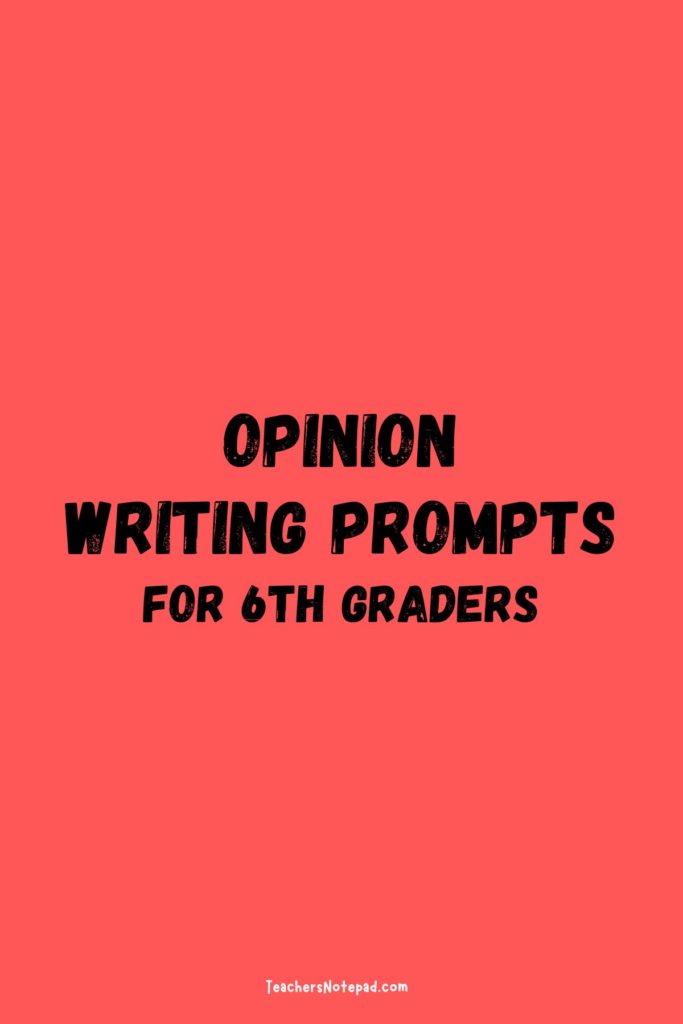
Reading Worksheets, Spelling, Grammar, Comprehension, Lesson Plans
50 Descriptive Essay Topics
Make your reader see, smell, hear and feel with these inspirational descriptive essay topics ! We’ve collected 50 descriptive essay topics to sprout some flowery language. Our descriptive essay topics are designed to spark creative thinking and can be modified for students in elementary, middle and high school. They are grouped by topic for easy student and teacher reference. Feel free to print the entire list for plenty of inspiration for your next descriptive essay assignment!
Descriptive Essay Topics: Place
- Describe your favorite place.
- Describe your ideal bedroom.
- Describe the house in which you grew up.
- Describe what the first house on the moon would look like.
- Describe some of your favorite places in your hometown.
- Describe a peaceful place that you’ve visited.
- Describe a place that exists only in your imagination.
- Describe a friend’s or family member’s house where you enjoy spending time.
- Describe your perfect fantasy vacation destination.
- Describe your favorite store.
- Describe your favorite teacher’s classroom.
- Describe a museum that you’ve visited recently.
- Describe a place you have dreamed about that doesn’t exist in real life.
- Describe a place where your pet likes spending time.
- Describe an outdoor place that you know well.
Descriptive Essay Topics: People
- Describe your favorite person.
- Describe each of your family members.
- Describe a famous person that you would like to meet.
- Describe one of your friends.
- Describe one aspect of someone that you like (for example: laugh, style of dress, words that the person likes to use, etc.)
- Describe yourself to someone who has never met you.
- Describe the average human to an alien who has never before seen a person.
- Describe your pet.
- Look at some old family photos and describe an older family member as he or she was when at your age.
- Describe someone whom you miss.
Descriptive Essay Topics: Objects
- Describe an object that is special to you.
- Give a tour of one room in your house by describing the most important objects in that room.
- Describe one of your favorite outfits.
- Describe your favorite toy as a child.
- Describe how you get around (for example: a bicycle, skateboard, sneakers, your parents’ car, the school bus).
- Describe your favorite piece of furniture where you like to spend time and relax.
- Describe something that you would bury in a time capsule to tell people about what life is like today.
- Describe an object that has been in your family for a long time.
- Choose a piece of food to eat; then, write a description of it that includes the way it looks, smells and tastes.
- Describe a smartphone to a time traveler from the 1900s.
Descriptive Essay Topics: Memories
- Describe your oldest memory.
- Describe your best summer vacation.
- Describe a memorable concert you attended.
- Describe a memorable trip you took.
- Describe a special time that you and your family had together.
- Describe the first time you met one of your friends.
- Describe a time you met someone famous.
- Describe one of your happiest memories.
- Describe one of your saddest memories.
- Describe a time that you felt scared.
- Describe a time that you felt excited.
- Describe a time that something totally unexpected happened.
- Describe a memory of someone whom you miss.
- Describe one of your most memorable first days of school.
- Describe one of your most embarrassing moments.
Looking for more essay topics? Compare and Contrast Essay Topics Cause and Effect Essay Topics Narrative Essay Topics Persuasive Essay and Speech Topics
Purdue Online Writing Lab Purdue OWL® College of Liberal Arts
Welcome to the Purdue Online Writing Lab

Welcome to the Purdue OWL
This page is brought to you by the OWL at Purdue University. When printing this page, you must include the entire legal notice.
Copyright ©1995-2018 by The Writing Lab & The OWL at Purdue and Purdue University. All rights reserved. This material may not be published, reproduced, broadcast, rewritten, or redistributed without permission. Use of this site constitutes acceptance of our terms and conditions of fair use.
The Online Writing Lab at Purdue University houses writing resources and instructional material, and we provide these as a free service of the Writing Lab at Purdue. Students, members of the community, and users worldwide will find information to assist with many writing projects. Teachers and trainers may use this material for in-class and out-of-class instruction.
The Purdue On-Campus Writing Lab and Purdue Online Writing Lab assist clients in their development as writers—no matter what their skill level—with on-campus consultations, online participation, and community engagement. The Purdue Writing Lab serves the Purdue, West Lafayette, campus and coordinates with local literacy initiatives. The Purdue OWL offers global support through online reference materials and services.
A Message From the Assistant Director of Content Development
The Purdue OWL® is committed to supporting students, instructors, and writers by offering a wide range of resources that are developed and revised with them in mind. To do this, the OWL team is always exploring possibilties for a better design, allowing accessibility and user experience to guide our process. As the OWL undergoes some changes, we welcome your feedback and suggestions by email at any time.
Please don't hesitate to contact us via our contact page if you have any questions or comments.
All the best,
Social Media
Facebook twitter.
The United States’ Entry into World War II: Causes and Impacts
This essay about the United States’ entry into World War II explores the complex factors that influenced this pivotal decision. Despite initial isolationist sentiment and the aftermath of World War I, events such as the Lend-Lease Act and the attack on Pearl Harbor compelled America to join the global conflict. Geopolitical tensions, economic interests, and ideological differences with fascist regimes all played a role. The essay highlights how America’s involvement reshaped the course of the war, ultimately leading to the defeat of Nazi Germany and Japan.
How it works
The ingress of the United States into the maelstrom of World War II delineated a pivotal juncture that wielded a profound impact on the denouement of the conflict. However, the rationale underlying this momentous decision proved far from simplistic. Despite the cataclysm engulfing Europe and Asia in the waning years of the 1930s, the U.S. hesitated to intervene. Numerous factors contributed to this hesitancy, encompassing prevalent isolationist sentiment and the specter of World War I. Nonetheless, the unfolding events in the early 1940s precipitated a shift in both public sentiment and governmental policy, propelling the United States into the global fray.
A paramount rationale for the initial abstention of the U.S. from World War II stemmed from the prevailing isolationist ethos that permeated the nation. The aftermath of the First World War, merely two decades prior, imbued Americans with a wariness of entanglements abroad. A substantial segment advocated for the avoidance of European and Asian conflicts altogether. This conviction found reinforcement in the Neutrality Acts of the 1930s, which sought to forestall American entanglement in external wars by proscribing arms sales and loans to belligerent nations.
Notwithstanding these constraints, President Franklin D. Roosevelt discerned the looming threat posed by the Axis powers, particularly after Germany’s incursion into Poland in 1939, which precipitated the outbreak of hostilities. He cautiously sought avenues to bolster Allied nations while officially preserving U.S. neutrality. The Lend-Lease Act of 1941 facilitated the provision of military assistance to Britain, the Soviet Union, China, and other allies without the direct involvement of American troops, marking a significant stride towards involvement while ostensibly upholding the veneer of neutrality.
The tide turned decisively on December 7, 1941, when Japan launched a surprise assault on the U.S. naval bastion at Pearl Harbor, Hawaii. This audacious attack, resulting in the loss of over 2,400 American lives and the decimation of a substantial portion of the Pacific Fleet, served as a catalytic force that galvanized the American populace against the Axis powers. It obliterated any vestiges of lingering isolationism and prompted Roosevelt to petition Congress for a declaration of war against Japan the ensuing day. In response, Germany and Italy, as Japan’s allies, reciprocally declared war on the U.S., thus entangling America fully in the maelstrom of World War II.
While the attack on Pearl Harbor constituted the immediate impetus for American entry into the conflict, underlying factors had been inexorably nudging the United States towards involvement for a considerable duration. The expansionist aspirations of Nazi Germany and Imperial Japan imperiled the global balance of power and America’s economic interests. By 1941, Germany had already annexed the lion’s share of Western Europe and posed a looming threat to the Soviet Union. Simultaneously, Japan aggressively expanded in Asia, annexing territories in China and Southeast Asia. These belligerent actions jeopardized crucial trade routes, resources, and American allies.
Moreover, the ideological chasm between democracies and fascist states rendered cooperation increasingly untenable. Nazi Germany’s expansionist agenda, disregard for international norms, and egregious violations of human rights stood in stark contrast to American values. For Roosevelt and other policymakers, supporting the Allies constituted not merely a strategic calculation but also a moral imperative aimed at thwarting the hegemony of totalitarian regimes.
America’s ingress into World War II wrought a seismic transformation in the trajectory of the conflict. Its vast industrial capacity and human resources played a pivotal role in buttressing and fortifying the Allied war effort. The United States played an instrumental role in tilting the scales in Europe, ultimately culminating in the defeat of Nazi Germany, and extending decisive support in the Pacific theater, culminating in Japan’s capitulation following the atomic bombings of Hiroshima and Nagasaki.
In conclusion, while the assault on Pearl Harbor served as the proximate trigger for American entry into World War II, a confluence of geopolitical, economic, and ideological considerations had been exerting a gravitational pull on United States policy for an extended duration. The amalgamation of national imperatives and global exigencies compelled the United States to align itself with the Allies in combatting the Axis powers. The ramifications of American ingress were profound, irrevocably shaping the outcome of the war and laying the groundwork for the post-war geopolitical landscape.
Cite this page
The United States’ Entry into World War II: Causes and Impacts. (2024, May 12). Retrieved from https://papersowl.com/examples/the-united-states-entry-into-world-war-ii-causes-and-impacts/
"The United States’ Entry into World War II: Causes and Impacts." PapersOwl.com , 12 May 2024, https://papersowl.com/examples/the-united-states-entry-into-world-war-ii-causes-and-impacts/
PapersOwl.com. (2024). The United States’ Entry into World War II: Causes and Impacts . [Online]. Available at: https://papersowl.com/examples/the-united-states-entry-into-world-war-ii-causes-and-impacts/ [Accessed: 15 May. 2024]
"The United States’ Entry into World War II: Causes and Impacts." PapersOwl.com, May 12, 2024. Accessed May 15, 2024. https://papersowl.com/examples/the-united-states-entry-into-world-war-ii-causes-and-impacts/
"The United States’ Entry into World War II: Causes and Impacts," PapersOwl.com , 12-May-2024. [Online]. Available: https://papersowl.com/examples/the-united-states-entry-into-world-war-ii-causes-and-impacts/. [Accessed: 15-May-2024]
PapersOwl.com. (2024). The United States’ Entry into World War II: Causes and Impacts . [Online]. Available at: https://papersowl.com/examples/the-united-states-entry-into-world-war-ii-causes-and-impacts/ [Accessed: 15-May-2024]
Don't let plagiarism ruin your grade
Hire a writer to get a unique paper crafted to your needs.

Our writers will help you fix any mistakes and get an A+!
Please check your inbox.
You can order an original essay written according to your instructions.
Trusted by over 1 million students worldwide
1. Tell Us Your Requirements
2. Pick your perfect writer
3. Get Your Paper and Pay
Hi! I'm Amy, your personal assistant!
Don't know where to start? Give me your paper requirements and I connect you to an academic expert.
short deadlines
100% Plagiarism-Free
Certified writers

IMAGES
VIDEO
COMMENTS
Narrative Essay Topic Ideas for Students. Argumentative Essay Topics for Middle School. Expository Essay Topic Ideas. Story Writing Topics for Grades 5 - 9. Essay writing curriculum 6th grade. These 37 essay topics for 6th graders will help your kids form opinions, explore their ideas on paper, and express their thoughts confidently.
Descriptive essay topic for the 6th Grade. Here are some fun and inspiring essay topic for 6th graders: Describe your favourite place. Describe your ideal bedroom. Describe the house in which you grew up. Describe what the first house on the moon would look like. Describe some of your favourite places in your hometown.
These prompts will help your sixth graders learn the essentials of procedural writing. 26. Make a user guide for anything you use frequently (e.g., your computer, smartphone, video game console). 27. Write a set of instructions for cleaning your room. 28.
6th grade students will be asked to argue for or against the ban of junk food in vending machines. Vending machines are often used by people who are hungry and in a hurry. The vending options are usually less than healthy. ... These essay topics will go along with any persuasive writing unit in your writing curriculum! Let your student go ...
Ask students to write about their own experiences and perspectives. Provide prompts that relate to current events or issues that are important to the students. Encourage students to explore their own values and beliefs through their writing. As a 6th grader, you are at an exciting stage of academic and personal growth.
Explore printable Essay Writing worksheets for 6th Grade Essay Writing worksheets for Grade 6 are an essential tool for teachers looking to enhance their students' reading and writing skills. These worksheets focus on various aspects of writing, including nonfiction writing, and are designed to help students develop a strong foundation in the ...
Conclusion On Essay Writing Topics For Class 6: Writing essays is an essential skill for students to develop, and by practicing writing on different topics, students can become better writers. The above essay topics can be a starting point for class 6 students, and by following the essay format, they can write well-structured essays that ...
You can create printable tests and worksheets from these Grade 6 Writing Essays questions! Select one or more questions using the checkboxes above each question. Then click the add selected questions to a test button before moving to another page. Select All Questions. Grade 6 Writing Essays. In the body of your paper, each paragraph should.
All Grades K-5 All Grades 6-12 PreK 6th Grade Kindergarten 7th Grade 1st Grade 8th Grade 2nd Grade 9th Grade 3rd Grade 10th Grade 4th Grade 11th Grade 5th Grade 12th Grade. ... Then use these persuasive essay topics for practice. Jump to: ... 40 Strong Persuasive Writing Examples (Essays, Speeches, Ads, and More) Learn from the experts. Read More.
Essay on Importance of Computer for Class 6. My Family Essay for Class 6. Essay on Most Memorable Day of My Life for Class 6. Essay on Punctuality for Class 6. Essay on Global Warming for Class 6. Essay on Importance of Reading for Class 6. Essay on Child Labour for Class 6. Unity in Diversity Essay for Class 6.
Choose from 100 prompts, story starters, research topics, and poetry ideas to start the writing process in a sixth-grade classroom.
43 Narrative Writing Prompts for 6th Grade. Narrative writing is a great way to help students take a break from more structured, academic writing, in order to reflect on their own thoughts or on things they've learned and experienced over time. Below, you'll find a list of narrative writing prompts to encourage your sixth graders to open up ...
31 Great 6th Grade Journal Prompts & Writing Ideas. 31 6th Grade Journal Prompts and Topics — As kids enter middle school and prepare to become teenagers, many sixth graders find themselves struggling to understand their emotions and to express their changing, unique personalities. It's a challenging time, for sure, but journaling can help.
Here, we are providing 6th Grade Essays in English for children to make habitual with different categories of essays. List of 6th Standard English Essays for Students. APlusTopper provided Essay Topics for Class 6 students is very beneficial to win first prizes in the essay writing competitions and good scores in exams.
The following are some of the simplest persuasive essay topics from myhomeworkdone.com that you can choose for 6th grade students: Laws should be placed to ban droopy pants. Snow days are better than sunny days for having family fun. Having too much money for kids is not a good idea. Parenting classes need to be administered to all teenagers.
They really need a structure for this. So, the typical essay, before they get to me, goes like this, and it is a good precursor: Introduction that states your thesis and 3 major reasons to support your claim. Reason 1. Reason 2. Reason 3. Conclusion that looks a whole lot like the introduction.
66 Opinion Prompts for 6th Grade. Everyone knows that sixth graders are full of opinions, especially their teachers and parents. These prompts are written as questions to let your students decide the answer and describe why they have a strong viewpoint. Channel that creativity and persuasion skill by having your sixth graders write to convince ...
List of 500+ Essay Writing Topics and Ideas. Essay topics in English can be difficult to come up with. While writing essays, many college and high school students face writer's block and have a hard time to think about topics and ideas for an essay. In this article, we will list out many good essay topics from different categories like ...
Descriptive Essay Topics: Place. Describe your favorite place. Describe your ideal bedroom. Describe the house in which you grew up. Describe what the first house on the moon would look like. Describe some of your favorite places in your hometown. Describe a peaceful place that you've visited. Describe a place that exists only in your ...
This workbook is the first in a series of three workbooks designed to improve the. development and use of effective essay questions. It focuses on the writing and use of. essay questions. The second booklet in the series focuses on scoring student responses to. essay questions.
The Online Writing Lab at Purdue University houses writing resources and instructional material, and we provide these as a free service of the Writing Lab at Purdue.
Grade 6 Performance Task General Instructions: This task has three parts: Part 1A, Part 1B, and Part 2. There are two sources provided. Read the letter to the editor in Source 1 and the comments in Source 2. Then, use them to answer the questions that follow in Part 1A and Part 1B, as well as Part 2. Overall Description of Task
each of these six example essays. The coloured hi-lights show where each student has done well in terms of including quotations (part of AO1), terminology (part of AO2) and context (AO3). Level 4 essay In Act 1, 7 Shakespeare shows how Lady Macbeth is ambitious and is determined to do the murder when Macbeth thinks about failing.
Essay Example: In the tapestry of history, the thread of Rosa Parks weaves a tale of defiance and determination, etching her name in the fabric of time as a luminary of courage and resilience. Her life's journey, from the shadowed corners of segregation to the forefront of the civil rights movement
Essay Example: The ancient inception of Buddhism, an esteemed and impactful faith, can be traced back to ancient India during the 6th century BCE. Initiated by Siddhartha Gautama, revered as the Buddha or the "Enlightened One," its teachings propagated across Asia, profoundly shaping diverse
Essay Example: Anne Frank, a luminary amidst the shadows of World War II, clandestinely sheltered for a span of 761 days, weaving a narrative of resilience amid perilous times. Commencing on the fateful eve of July 6, 1942, and concluding tragically on August 4, 1944, Anne's odyssey in hiding
Essay Example: The aptitude quotient assessments, alternatively labeled as IQ tests, have perennially stood as a cornerstone of psychological evaluation, proffering a numerical appraisal of an individual's cerebral prowess. They wield substantial influence in scholastic placements, vocational
Essay Example: Cannibal serial killers have long held a dark fascination in the public imagination, often occupying a special place in the annals of criminal history. Their crimes, characterized by a disturbing blend of murder and cannibalism, horrify and intrigue both the public and experts
Essay Example: The ingress of the United States into the maelstrom of World War II delineated a pivotal juncture that wielded a profound impact on the denouement of the conflict. However, the rationale underlying this momentous decision proved far from simplistic. Despite the cataclysm engulfing